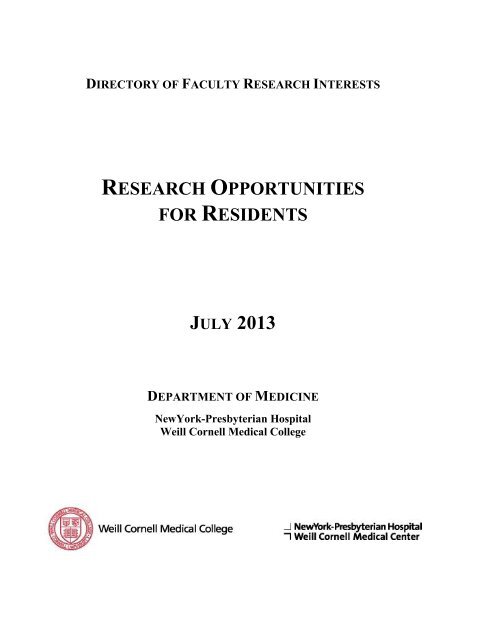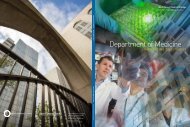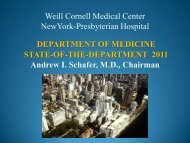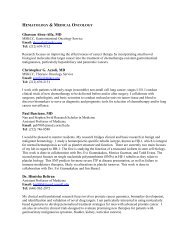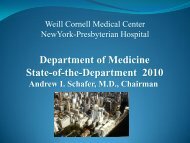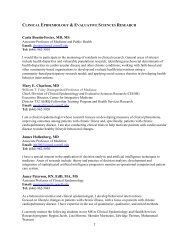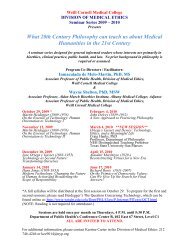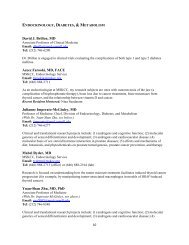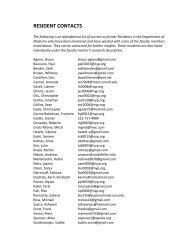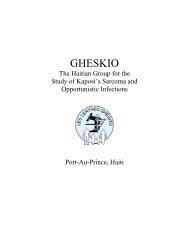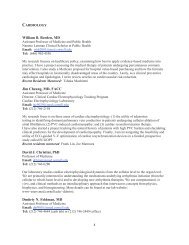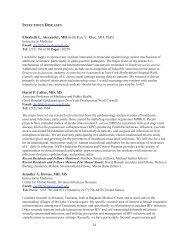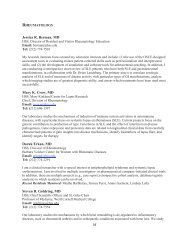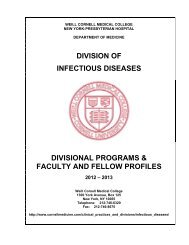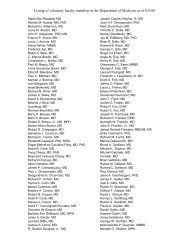research opportunities for residents - Weill Cornell Department of ...
research opportunities for residents - Weill Cornell Department of ...
research opportunities for residents - Weill Cornell Department of ...
- No tags were found...
You also want an ePaper? Increase the reach of your titles
YUMPU automatically turns print PDFs into web optimized ePapers that Google loves.
DIRECTORY OF FACULTY RESEARCH INTERESTSRESEARCH OPPORTUNITIESFOR RESIDENTSJULY 2013DEPARTMENT OF MEDICINENewYork-Presbyterian Hospital<strong>Weill</strong> <strong>Cornell</strong> Medical College
Faculty Research Interests:INTRODUCTIONThe following are brief descriptions <strong>of</strong> <strong>research</strong> areas <strong>of</strong> interest by individual faculty members,organized by discipline. The final category — Other Areas <strong>of</strong> Research — includes a number <strong>of</strong>other important fields such as public health, in<strong>for</strong>matics, epidemiology, cancer genetics, etc.Each <strong>of</strong> the faculty members listed here has volunteered to mentor our <strong>residents</strong>. (There arelikely to be many others at <strong>Weill</strong> <strong>Cornell</strong>, MSKCC, Rockefeller, and HSS who are equallyenthusiastic about the possibility <strong>of</strong> working on <strong>research</strong> projects with our <strong>residents</strong>, but whohave not yet responded to our requests <strong>for</strong> in<strong>for</strong>mation.) Most <strong>of</strong> the descriptions <strong>of</strong> <strong>research</strong>areas were provided by the faculty members directly. Descriptions are followed by the names <strong>of</strong>recent <strong>residents</strong> mentored, if any: these <strong>residents</strong> are also cross-referenced alphabetically at theend <strong>of</strong> the guide, and we encourage you to contact any <strong>of</strong> them who might be able to provide youwith further insight. Contact in<strong>for</strong>mation is listed as provided by faculty members.To visit the education section <strong>of</strong> the <strong>Department</strong> <strong>of</strong> Medicine website:www.cornellmedicine.com/educationTo go directly to the Research Opportunities page, visit:http://www.cornellmedicine.com/education/<strong>research</strong>_overview/<strong>research</strong>_<strong>for</strong>_<strong>residents</strong>.html2
TABLE OF CONTENTSCARDIOLOGY 4CLINICAL EPIDEMIOLOGY &EVALUATIVE SCIENCES RESEARCH 7CLINICAL PHARMACOLOGY 9ENDOCRINOLOGY, METABOLISM, & DIABETES 10GASTROENTEROLOGY & HEPATOLOGY 11GERIATRIC AND PALLIATIVE MEDICINE 14HEMATOLOGY & MEDICAL ONCOLOGY 16INFECTIOUS DISEASES 28NEPHROLOGY & HYPERTENSION 32PULMONARY, CRITICAL CARE, & SLEEP MEDICINE 34RHEUMATOLOGY 35OTHER AREAS OF RESEARCH 39INDEX BY TOPICS 42INDEX BY DISCIPLINE 51RESIDENT CONTACTS 553
CARDIOLOGYJim Cheung, MD, FACCAssistant Pr<strong>of</strong>essor <strong>of</strong> MedicineDirector, Clinical Cardiac Electrophysiology Training ProgramCardiac Electrophysiology LaboratoryEmail: jac9029@med.cornell.eduTel: (212) 746-2158My <strong>research</strong> focus is on three areas <strong>of</strong> cardiac electrophysiology: (1) the utility <strong>of</strong> adenosinetesting in identifying dormant pulmonary vein conduction in patients undergoing catheter ablation <strong>of</strong>atrial fibrillation; (2) PVC-induced cardiomyopathy; and (3) cardiac resynchronization therapy.I have also started a project tracking the natural history <strong>of</strong> patients with high PVC burden and elucidatingclinical predictors <strong>for</strong> the development <strong>of</strong> cardiomyopathy. Finally, I am investigating the feasibility andutility <strong>of</strong> ECG-guided V-V optimization <strong>of</strong> cardiac resynchronization devices in a funded, prospectivestudy called ECGOPT.Recent <strong>residents</strong> mentored: Frank Lin, Joe MarmoraDavid J. Christini, PhDPr<strong>of</strong>essor <strong>of</strong> MedicineEmail: dchristi@med.cornell.eduTel: (212) 746-6280Our laboratory studies cardiac electrophysiological dynamics from the cellular level to the organ level.We are primarily interested in understanding the mechanisms underlying arrhythmia initiation (from thecellular to whole-heart levels) and in developing new arrhythmia therapies. We use computational, invitro, and clinical methods in an interdisciplinary approach that interweaves concepts from physics,biophysics, and bioengineering. More details can be found at our lab website: www.christinilab.orgDmitriy N. Feldman, MDAssistant Pr<strong>of</strong>essor <strong>of</strong> Medicine; Director, Endovascular ServicesEmail: dnf9001@med.cornell.eduTel: (212) 746-4644 (cath lab) or (212) 746-2449 (<strong>of</strong>fice)As an interventional cardiologist and endovascular specialist, my <strong>research</strong> interest is focused onpercutaneous coronary and endovascular interventions outcomes, including extensive work with the NewYork State <strong>Department</strong> <strong>of</strong> Health PCI database, the National American College <strong>of</strong> Cardiology NCDRregistry, and the <strong>Weill</strong> <strong>Cornell</strong> Catheterization Laboratory institutional database. Clinical <strong>research</strong>expertise includes post-PCI outcomes <strong>research</strong>; the use <strong>of</strong> peri-procedural pharmacological agents andplatelet function testing; and evaluating novel endovascular technologies (eg. renal denervation <strong>for</strong>resistant hypertension).Recent Residents or Fellows Mentored: Subhi AlAref, Jonathan Gordin, Lindsay Lief, KonstantinosCharitakis, David Yang (fellow), Luke Kim, Rajesh Swaminathan (fellow), Scott Midwall (fellow), AliHaider (fellow)Bruce B. Lerman, MDPr<strong>of</strong>essor <strong>of</strong> Medicine; Chief, Greenberg Division <strong>of</strong> CardiologyEmail: blerman@med.cornell.eduTel: (212) 746-21694
Our laboratory’s focus is on delineating the regulation <strong>of</strong> G proteins that couple cell-surface receptors tointracellular cAMP and their role in mediating adrenergically dependent ventricular tachycardia, alsoknown as right and left ventricular outflow tract tachycardia.Fay Y. Lin, MD, MScAssistant Pr<strong>of</strong>essor <strong>of</strong> MedicineEmail: fal9003@med.cornell.eduTel: (212) 746-4655My interest is in the utility <strong>of</strong> advanced cardiac imaging modalities, including coronary CT angiographyand advanced echocardiography, <strong>for</strong> mechanisms <strong>of</strong> disease in heart failure with normal ejection fraction,and in risk stratification in CAD.Steven Markowitz, MDAssociate Pr<strong>of</strong>essor <strong>of</strong> MedicineEmail: smarkow@med.cornell.eduTel: (212) 746-2655Our group studies the mechanisms and therapies <strong>for</strong> atrial arrhythmias, including atrial fibrillation andatrial tachycardias. We are interested in defining the sites <strong>of</strong> origin and properties <strong>of</strong> atrial tachycardias aswell as predictors <strong>of</strong> successful ablative therapy. Other areas <strong>of</strong> interest include imaging <strong>of</strong> structuralabnormalities in patients with ventricular tachycardia and long-term follow-up <strong>of</strong> patients who have animplantable rhythm device.Recent Residents Mentored: James Horowitz, Alex Mauskop, Ashwani Sastry, Amiran Baduashvili,Louis WaldmanPeter M. Okin, MDPr<strong>of</strong>essor <strong>of</strong> MedicineEmail: pokin@med.cornell.eduTel: (212) 746-4688My <strong>research</strong> focuses on the use <strong>of</strong> the standard 12-lead ECG to improve risk stratification and on thedevelopment <strong>of</strong> new ECG predictors <strong>of</strong> disease and outcomes. Most recently, we have firmly establishedthe value <strong>of</strong> regression <strong>of</strong> left ventricular hypertrophy on ECG <strong>for</strong> prediction <strong>of</strong> decreased risk <strong>of</strong> MI,stroke, cardiovascular death, sudden death, new atrial fibrillation, new heart failure, and the development<strong>of</strong> new diabetes.Recent Residents Mentored: Seth Bender (currently <strong>Weill</strong> <strong>Cornell</strong> Cardiology Fellow), Joseph KreppMary J. Roman, MDPr<strong>of</strong>essor <strong>of</strong> MedicineEmail: mroman@med.cornell.eduTel: (212) 746-4685I am involved in three areas <strong>of</strong> clinical <strong>research</strong>. The first area is Marfan syndrome and other geneticallymediatedaortic aneurysm syndromes. I am the PI <strong>of</strong> a multicenter, NIH-funded treatment trial to preventaneurysm progression in children and young adults with Marfan syndrome, and co-investigator <strong>of</strong> amulticenter, NIH-funded registry <strong>of</strong> genetically triggered thoracic aortic aneurysms. The second areaconcerns cardiovascular involvement in rheumatologic diseases, particularly systemic lupuserythematosus and rheumatoid arthritis, and the importance <strong>of</strong> chronic inflammation in directly causing5
premature atherosclerosis, vascular stiffening, and ventricular hypertrophy in these patients. Finally, I ampart <strong>of</strong> an NIH-funded team studying cardiovascular risk factors and disease in American Indians.Wendy Schaffer, MDMSKCC, Cardiology ServiceEmail: schaffew@mskcc.orgTel: (212) 639-3735My <strong>research</strong> is related to cancer patients and their cardiac function. Current projects include evaluation <strong>of</strong>:(1) appropriate anticoagulation <strong>for</strong> cancer patients with mechanical heart valves; (2) right ventriculardysfunction in patients after pericardial window or pericardiocentesis; (3) cardiac toxicity <strong>of</strong> peripheralblood stem cell transplant in patients with underlying CAD. There are a number <strong>of</strong> small, easilypublishable projects related to this work that would be amenable to the time/resources <strong>of</strong> a resident.Jonathan W. Weinsaft, MDAssociate Pr<strong>of</strong>essor <strong>of</strong> Medicine; Director, Cardiac MR/CT Imaging ProgramEmail: jww2001@med.cornell.eduTel: (212) 746-2437I look <strong>for</strong>ward to ongoing <strong>opportunities</strong> to work with <strong>residents</strong> interested in my <strong>research</strong> area <strong>of</strong> noninvasivecardiac imaging as a tool to assess myocardial per<strong>for</strong>mance, tissue composition, and cardiacremodeling. While much <strong>of</strong> the <strong>research</strong> is focused on use <strong>of</strong> cardiac magnetic resonance imaging (CMR),studies typically integrate other modalities such as echocardiography, nuclear, or CT-based imaging.Residents will have the opportunity to participate in all aspects <strong>of</strong> ongoing clinical <strong>research</strong> studies,including image processing, interpretation, and data analysis.Recent Residents Mentored: Jason Chinitz, Christopher Chu, Christopher Gade, Taral Patel, MichaelRoss6
CLINICAL EPIDEMIOLOGY & EVALUATIVE SCIENCES RESEARCHCarla Boutin‐Foster, MD, MSAssociate Pr<strong>of</strong>essor <strong>of</strong> Medicine and Public HealthEmail: cboutin@med.cornell.eduTel: (646) 962-5010I would like to participate in the mentoring <strong>of</strong> <strong>residents</strong> in clinical <strong>research</strong>. General areas <strong>of</strong> interestinclude health disparities and vulnerable populations <strong>research</strong>; identifying psychosocial determinants <strong>of</strong>health disparities in cardiovascular disease and other chronic conditions; working with faith‐based andother community‐based organizations to develop and evaluate health interventions using acommunity‐based participatory <strong>research</strong> model; and applying social science theories in developing healthbehavior interventions.Mary E. Charlson, MDWilliam T. Foley Distinguished Pr<strong>of</strong>essor <strong>of</strong> MedicineChief, Division <strong>of</strong> Clinical Epidemiology and Evaluative Sciences Research (CEESR)Executive Director, Center <strong>for</strong> Integrative MedicineDirector T32 AHRQ Fellowship Training Program and Health Services ResearchEmail: mecharl@med.cornell.eduTel: (646) 962-5020I am a clinical epidemiologist whose <strong>research</strong> focuses on developing measures <strong>of</strong> clinical phenomena,improving outcomes among patients with chronic illness and, specifically, patients with chroniccardiopulmonary disease. I am also conducting clinical trials to help motivate patients with cardiovasculardisease to make healthy lifestyle behavioral changes.James Hollenberg, MDAssociate Pr<strong>of</strong>essor <strong>of</strong> MedicineEmail: jph2002@med.cornell.eduTel: (646) 962-5030I have a special interest in the application <strong>of</strong> decision analytic and artificial intelligence techniques tomedicine. Areas <strong>of</strong> <strong>research</strong> include: theory and practice <strong>of</strong> decision analysis; development andintegration <strong>of</strong> sophisticated artificial intelligence program to monitor an operational computerized patientcare system.Janey Peterson, EdD, MS, RNAssistant Pr<strong>of</strong>essor <strong>of</strong> Clinical EpidemiologyEmail: jcpeters@med.cornell.eduTel: (646) 962-5000As a behavioral scientist and clinical epidemiologist, my <strong>research</strong> focuses on lifestyle change in olderadults with multiple chronic diseases. I am also interested in the study <strong>of</strong> financial elder abuse. I haveexpertise in the use <strong>of</strong> quantitative, qualitative, and mixed methods <strong>research</strong>.Recent Residents or Fellows Mentored: Edwidge Thomas (fellow); Muhammad Waseem (fellow)7
Erica Phillips-Caesar, MD, MSAssistant Pr<strong>of</strong>essor <strong>of</strong> MedicineDirector, Research Program, Primary Care Track, Internal Medicine Residency ProgramEmail: erp2001@med.cornell.eduTel: (646) 962‐5013I teach the basics <strong>of</strong> <strong>research</strong> methodology to all primary care <strong>residents</strong> and co-mentor their scholarlyprojects. My <strong>research</strong> interest is focused on the use <strong>of</strong> community-based participatory <strong>research</strong> inaddressing healthcare disparities among ethnic minority communities. Currently, I am a co-investigatoron two NIH-funded studies: SCALE (Small Changes and Lasting Effects) and CEDREC (TheComprehensive Center <strong>of</strong> Excellence in Disparities Research and Community Engagement). ThroughCEDREC I work on partnering <strong>residents</strong> interested in disparities <strong>research</strong> with one <strong>of</strong> our investigationalteams.8
CLINICAL PHARMACOLOGYMarcus M. Reidenberg, MDPr<strong>of</strong>essor <strong>of</strong> Medicine, Pharmacology, and Public HealthChief, Division <strong>of</strong> Clinical PharmacologyEmail: mmreid@med.cornell.eduTel: (212) 746-6227Focus <strong>of</strong> <strong>research</strong> is on problems with medications, e.g., how the elderly differ from younger people indose-response and genetic polymorphisms affecting dose-response. As a member <strong>of</strong> the World HealthOrganization (WHO) Expert Panel on the Selection and Use <strong>of</strong> Essential Medicines, I would be delightedto help <strong>residents</strong> interested in issues in clinical pharmacology develop answerable questions pertinent tothese issues and then proceed to answer the questions. Residents interested in global policy concerningavailability and use <strong>of</strong> essential medicines can help with WHO activities in this area. Projects can bedesigned to start slowly at any time during the residency and proceed at the pace the resident desires.Mentoring in publishing case reports is also provided.9
ENDOCRINOLOGY, DIABETES, & METABOLISMDavid J. Brillon, MDPr<strong>of</strong>essor <strong>of</strong> Clinical MedicineEmail: djbrillo@med.cornell.eduTel: (212) 746-6290I am engaged in clinical trials evaluating the complications <strong>of</strong> both type 1 and type 2 diabetes mellitus andwelcome hearing from <strong>residents</strong> or fellows.Azeez Farooki, MD, FACEMSKCC, Endocrinology ServiceEmail: farookia@mskcc.orgTel: (646) 888-2711As an endocrinologist at MSKCC, my <strong>research</strong> subjects are ones with osteonecrosis <strong>of</strong> the jaw (acomplication <strong>of</strong> bisphosphonate therapy), bone loss due to cancer treatments, bone metastases fromthyroid cancer, and the relationship between vitamin D and cancer.Recent Residents Mentored: Nina SundaramJulianne Imperato-McGinley, MDPr<strong>of</strong>essor <strong>of</strong> MedicineChief, Division <strong>of</strong> Endocrinology, Diabetes, and Metabolism(With Dr. Yuan-Shan Zhu, see below.)Email: jimperato@med.cornell.eduTel: (212) 746-6277Clinical and translational <strong>research</strong> projects include: (1) androgens and cognitive function; (2) moleculargenetics <strong>of</strong> sexual differentiation and development; (3) androgens and cardiovascular disease; (4)molecular basis <strong>of</strong> sex steroid hormone interaction in prostate diseases; (5) effects and mechanisms <strong>of</strong>diet, botanicals, and phytochemicals on prostate tumorigenesis, prostate cancer prevention, and therapy.Yuan-Shan Zhu, MD, PhDAssociate Pr<strong>of</strong>essor <strong>of</strong> Medicine(With Dr. Imperato-McGinley, see above.)Email: yuz2002@med.cornell.eduTel: (212) 746-8348Clinical and translational <strong>research</strong> projects include: (1) androgens and cognitive function; (2) moleculargenetics <strong>of</strong> sexual differentiation and development; (3) androgens and cardiovascular disease; (4)molecular basis <strong>of</strong> sex steroid hormone interaction in prostate diseases; (5) effects and mechanisms <strong>of</strong>diet, botanicals, and phytochemicals on prostate tumorigenesis, prostate cancer prevention, and therapy.10
GASTROENTEROLOGY & HEPATOLOGYBrian P. Bosworth, MDAssistant Pr<strong>of</strong>essor <strong>of</strong> MedicineProgram Director, Gastroenterology and Hepatology Fellowship ProgramEmail: bpb9002@med.cornell.eduTel: (212) 746-5077At the Jill Roberts Center <strong>for</strong> Inflammatory Bowel Disease (IBD), we actively welcome and encourage<strong>residents</strong>’ participation in our clinical and translational investigations. We have <strong>opportunities</strong> <strong>for</strong> <strong>residents</strong>to engage in all aspects <strong>of</strong> IBD-related <strong>research</strong>, from prospective trials <strong>of</strong> biomarker evaluation orpharmacological intervention, to chart reviews, to web-based IBD education initiatives. We also haveprojects involving basic science and animal work with our colleagues at Rockefeller and MSKCC on boththe immunologic and microbiologic etiopathogenesis <strong>of</strong> IBD.Recent Residents or Fellows Mentored: Nikhil Kumta, Tara Lautenslager, Mamta Mehta, Yasmin Metz,Alyssa Parian, Farid Razavi, Geethan Sivanthan, Subha Sundararajan, Scott Kramer, Kunal KariaCarl V. Craw<strong>for</strong>d, MDAssistant Pr<strong>of</strong>essor <strong>of</strong> MedicineEmail: cvc9002@med.cornell.eduTel: (646) 962-4000I have several areas <strong>of</strong> interest. My main areas <strong>of</strong> <strong>research</strong> focus is on C. difficile and enteric infections onspecific patient populations (IBD patients, leukemia/BMT populations, and the elderly). I am alsocurrently working with <strong>residents</strong> on the role <strong>of</strong> technology on colon polyp detection rates and the role <strong>of</strong>phytochemicals in the prevention <strong>of</strong> certain GI diseases. There are <strong>opportunities</strong> <strong>for</strong> <strong>residents</strong> to engage inlab work, chart reviews, and prospective studies as well as designing any studies they may have in mindrelated to the above areas.Recent Residents or Fellows Mentored: Valerie Antoine-Gustave, Lianne Cavell, Nikhil Kumta, AnnMarie Liapakis, Yasmin Metz, Manan ShahAndrew Dannenberg, MDPr<strong>of</strong>essor <strong>of</strong> Medicine; Director, Cancer CenterEmail: ajdannen@med.cornell.eduTel: (212) 746-4403Our main <strong>research</strong> focus is defining the mechanism by which chronic inflammation predisposes to cancer,with the long-term goal <strong>of</strong> developing strategies to reduce risk. Studies are under way that focus onobesity, smoking, hereditary cancer, inflammatory bowel disease, and nutrigenomics. The potential use <strong>of</strong>metabolomics <strong>for</strong> biomarker development is also being investigated.Ype P. de Jong, MD, PhDAssistant Pr<strong>of</strong>essor <strong>of</strong> MedicineEmail: ydj2001@med.cornell.edu, yjong@rockefeller.eduTel: (212) 327-7085My <strong>research</strong> interest is to study how hepatitis C virus (HCV) evades the immune system. HCV onlyinfects human hepatocytes and there currently exists a paucity <strong>of</strong> model systems. In the laboratory <strong>of</strong> Dr.Charles Rice at The Rockefeller University, I am working on improving an in vivo HCV infection system11
that involves transplanting human hepatocytes into mice. Projects on which I would welcome <strong>residents</strong> toparticipate include: (1) generation and in vitro characterization <strong>of</strong> innate immune-modifying lentiviralvectors; (2) transplantation optimization <strong>of</strong> human hepatocytes into different liver injury mouse lines;(3) treatment trials <strong>of</strong> new direct-acting antivirals in mice.Vinita Jacob, MDAssistant Pr<strong>of</strong>essor <strong>of</strong> MedicineEmail: vij9004@med.cornell.eduTel: (212) 746-5077At the Jill Roberts Center <strong>for</strong> Inflammatory Bowel Disease (IBD) we work closely with <strong>residents</strong> andfellows. Given the impact <strong>of</strong> IBD on young female patients in their peak reproductive years, the JillRoberts IBD Center emphasizes the goal <strong>of</strong> maintaining these particular patients in remission byconducting multiple interviews to ascertain their status <strong>of</strong> fertility and safety to the fetus with regards tomedication use, especially immunosuppressive therapy. Currently, we are enrolled in the largestprospective study to date, analyzing pregnancy outcomes in women with IBD exposed to biologic andimmunomodulator therapy.Recent Residents and Fellows Mentored: Melissa RosenIra M. Jacobson, MDPr<strong>of</strong>essor <strong>of</strong> Medicine; Chief, Division <strong>of</strong> Gastroenterology and HepatologyEmail: imj2001@med.cornell.eduTel: (646) 962-4040Clinical <strong>research</strong> projects involve viral hepatitis and other <strong>for</strong>ms <strong>of</strong> liver disease. Opportunities <strong>for</strong>projects <strong>for</strong> <strong>residents</strong> include: (1) prevalence <strong>of</strong> HBV markers in patients with HCV-related liver cancer;(2) decline in platelet count as a marker <strong>of</strong> liver fibrosis; (3) renal effects <strong>of</strong> antiviral agents <strong>for</strong> hepatitis.Steven Lipkin, MD, PhDAssociate Pr<strong>of</strong>essor <strong>of</strong> MedicineEmail: stl2012@med.cornell.eduTel: (212) 774-7160My <strong>research</strong> focuses on understanding genetic variants that cause increased risk <strong>of</strong> cancer and IBD, andon using a new mouse model <strong>of</strong> colon cancer that metastasizes to liver that we recently developed toidentify anti-metastasis drugs.Recent Residents or Fellows Mentored: Vesta SalehiEllen J. Scherl, MDDirector, Jill Roberts Center <strong>for</strong> Inflammatory Bowel DiseaseAssociate Pr<strong>of</strong>essor <strong>of</strong> MedicineEmail: ejs2005@med.cornell.eduTel: (212) 746-5077The Roberts IBD Center is involved with more than 25 national and international multicenter trials andinvestigator-initiated trials focusing on both ulcerative colitis and Crohn’s disease. We welcomecollaboration with <strong>residents</strong>. Investigator-initiated trials include collaborations with <strong>research</strong>ers at <strong>Weill</strong><strong>Cornell</strong> Medical Center (investigating mechanisms <strong>of</strong> inflammation), <strong>Cornell</strong> University (identifying therole <strong>of</strong> the gut microbiome), and with WCMC/NYPH <strong>research</strong>ers (investigating the immunogenetics andimmunobiology <strong>of</strong> IBD). The Roberts IBD Center is investigating the role <strong>of</strong> genetics and GI12
inflammation, the role <strong>of</strong> bacteria in gut inflammation, and a groundbreaking concept (e.g., an inflamedintestine may recruit stem cells to build new blood vessels that promote continued inflammation).Recent Residents Mentored: Mamta Mehta, Yasmin Metz, Alyssa Parian, Subha Sundararajan, RajaTaunk, Himanshu Verma, Melissa RosenFelice Schnoll‐Sussman, MDAssistant Pr<strong>of</strong>essor <strong>of</strong> MedicineEmail: fhs2001@med.cornell.eduTel: (212) 746-4400Clinical <strong>research</strong> at the Monahan Center in the field <strong>of</strong> screening and prevention <strong>of</strong>gastrointestinal malignancies. Active trials include chemoprevention <strong>of</strong> Barrett’sesophagus, understanding behavioral risk factors <strong>for</strong> the development <strong>of</strong> Barrett’s esophagus, earlydetection <strong>of</strong> familial pancreatic cancer, and public outreach initiatives <strong>for</strong> colorectal cancer screening.Recent Residents Mentored: Lianne Cavell, Roberto Gonzalez, Nikhil KumtaMSKCC GASTROENTEROLOGY AND NUTRITION SERVICEMaya Gambarin-Gelwan, MDAssociate Pr<strong>of</strong>essor <strong>of</strong> Clinical MedicineEmail: gambarim@mskcc.orgTel: (212)639-7336I study the prevalence <strong>of</strong> de novo non-alcoholic fatty liver disease in bone marrow transplant survivors,its risk factors and impact on survival. Specifically, I am investigating whether patients with pre-existingnon-alcoholic fatty liver disease have higher liver-related complications <strong>of</strong> bone marrow transplantation.Future studies address anti-viral therapy <strong>for</strong> chronic hepatitis C in patients with hepatocellular carcinomawho underwent curative resection.Recent Residents or Fellows Mentored: Monica Saumoy, Arun Jesudian, Eugene Licht, Delia Calo,Geethan Sivananthan, Subha Sundararajan, Stephanie Tang, Amy TybergEmmy Ludwig, MD/Robert Kurtz, MDEmail: ludwige@mskcc.org; kurtzr@mskcc.orgTel: (212) 639-2766, (212) 639-7620Family Pancreatic Tumor Registry: This is an ongoing project to identify pancreatic cancer risk andcancer precursor lesions in individuals with multiple first degree relatives affected by pancreatic cancer. ;hepatitis B reactivation prevention in individuals who are receiving immunosuppressive treatment.Sidney J. Winawer, MDPaul Sherlock Chair in Medicine, MSKCCPr<strong>of</strong>essor <strong>of</strong> Medicine, WCMCEmail: winawers@mskcc.orgTel: (212) 639-7678Observations within the framework <strong>of</strong> an ongoing randomized trial <strong>of</strong> screening colonoscopy versusFOBt, including familial risk, pathology <strong>of</strong> polyps, African American findings, and overall results.13
GERIATRIC AND PALLIATIVE MEDICINERonald D. Adelman, MDEmilie Roy Corey Pr<strong>of</strong>essor in Geriatrics and Gerontology; Co-Chief, Division <strong>of</strong> Geriatric MedicineEmail: rdadelma@med.cornell.eduTel: (212) 746-1729Current ongoing <strong>research</strong> projects in which <strong>residents</strong> might like to participate include: (1) a New YorkState Office <strong>of</strong> Mental Health grant integrating mental health care into an outpatient geriatric medicalpractice; (2) an Altman Foundation grant integrating palliative care into lung cancer care and emergencymedicine; (3) communication studies between older patients and their healthcare providers in outpatientmedical encounters and <strong>research</strong> focused on communication at the end <strong>of</strong> life; and (4) <strong>research</strong> onsymptom relief and possible interventions <strong>for</strong> frail elderly on dialysis.Emily S. Finkelstein, MDAssistant Pr<strong>of</strong>essor <strong>of</strong> MedicineEmail: emf9009@med.cornell.eduTel: (212) 746-1845I would love to work with interns and <strong>residents</strong> with an interest in advance care planning, baby boomersand successful aging, or primary care health policy re<strong>for</strong>m. Areas <strong>of</strong> <strong>research</strong> interest: (1) baby boomersand advance care planning; (2) the geriatric medical home (what it entails, how it works, how muchsupport it requires); (3) starting a time-motion study <strong>of</strong> how much time physicians and other clinical staffmembers in the ambulatory care practice spend doing clinical activities that are non-reimbursable.Mark S. Lachs, MD, MPHPr<strong>of</strong>essor <strong>of</strong> Medicine; Co-Chief, Division <strong>of</strong> Geriatric MedicineEmail: mslachs@med.cornell.eduTel: (212) 746-1677Major areas <strong>of</strong> <strong>research</strong> interest are the disenfranchised elderly, elder abuse, domestic violence, and theinterface <strong>of</strong> geriatrics with other specialties (e.g., oncology, emergency medicine). Currently fundedprojects in which <strong>residents</strong> might like to participate include: (1) a study <strong>of</strong> aggressive behaviors betweennursing home <strong>residents</strong> with and without dementia; (2) a large study <strong>of</strong> elder abuse prevalence; and (3)creation <strong>of</strong> the New York City Elder Abuse Center (NYCEAC), <strong>of</strong> which I am the Director. I would behappy to provide general career guidance to <strong>residents</strong> interested in careers in clinical epidemiology, healthservices <strong>research</strong>, and similar areas, whether or not they are related to aging.Karl Pillemer, PhDHazel E. Reed Pr<strong>of</strong>essor <strong>of</strong> Human Development, <strong>Cornell</strong> UniversityPr<strong>of</strong>essor <strong>of</strong> Gerontology in Medicine, <strong>Weill</strong> <strong>Cornell</strong> Medical CollegeDirector, <strong>Cornell</strong> Institute <strong>for</strong> Translational Research on AgingEmail: kap6@cornell.eduTel: (607) 255-8086My areas <strong>of</strong> expertise are gerontology, with special interests in (1) family relationships <strong>of</strong> older people,including care giving <strong>for</strong> disabled elders; (2) institutional and community-based care <strong>for</strong> older people; (3)methods <strong>of</strong> disseminating <strong>research</strong>-based in<strong>for</strong>mation to pr<strong>of</strong>essionals and the public.14
Barrie Raik, MDAssociate Pr<strong>of</strong>essor <strong>of</strong> Clinical MedicineEmail: bar2008@med.cornell.eduTel: (212) 746-4888My area <strong>of</strong> interest is how technology can assist aging adults to remain functional and as independent aspossible using telecommunication and mobile monitoring devices. I am currently studying interactiveworkshops in chronic disease self-management over the internet with a homebound population.M. Cary Reid, Jr., MD, PhDAssociate Pr<strong>of</strong>essor <strong>of</strong> MedicineDirector, Office <strong>of</strong> Geriatric ResearchEmail: mcr2004@med.cornell.eduTel: (212) 746-1378I direct an NIH-funded center (<strong>Cornell</strong>-Columbia Translational Research Institute on Pain in Later Life)that supports translational <strong>research</strong> ef<strong>for</strong>ts on the topic <strong>of</strong> pain and pain management. Opportunitiesinclude: understanding the role <strong>of</strong> mobile health technologies in the management <strong>of</strong> pain; translatingevidence-based pain programs <strong>for</strong> use in non-clinical settings; addressing barriers to the use <strong>of</strong> opioidmedications as a treatment <strong>for</strong> chronic non-cancer pain in older adults; working with community agenciesserving older adults in New York City as a means <strong>of</strong> extending the reach <strong>of</strong> pain management programsand developing new strategies to deliver palliative care interventions to vulnerable patient populations.Eugenia L. Siegler, MDPr<strong>of</strong>essor <strong>of</strong> Clinical MedicineEmail: els2006@med.cornell.eduTel: 212-746-1772, 212-746-7000Areas <strong>of</strong> <strong>research</strong> interest include: evaluating and improving the quality <strong>of</strong> electronic documentation;assessment <strong>of</strong> functional outcomes and quality <strong>of</strong> life after TAVR placement (with Ryan Kaple <strong>of</strong>cardiology).Recent Residents Mentored: Brian Eiss, Mallory Otto15
HEMATOLOGY & MEDICAL ONCOLOGYGhassan Abou-Alfa, MDMSKCC, Gastrointestinal Oncology ServiceEmail: abou-alg@mskcc.orgTel: (646) 888-4184Research focuses on improving the effectiveness <strong>of</strong> cancer therapy by incorporating small novelbiological molecules that target cancer into the treatment <strong>of</strong> chemotherapy-resistant gastrointestinalmalignancies, particularly hepatobiliary and pancreatic cancers.Paul Basciano, MDNan and Stephen Swid Research Scholar in MedicineAssistant Pr<strong>of</strong>essor <strong>of</strong> MedicineEmail: pab7003@med.cornell.eduTel: (212) 746-0580I would be pleased to mentor <strong>residents</strong>. My <strong>research</strong> bridges clinical and basic <strong>research</strong> in benign andmalignant hematology. I study a hematopoietic-specific tubulin isotype, known as Hβ-1, which is integral<strong>for</strong> normal hematopoiesis as well as platelet structure and function. There are currently two main focuses.The first is studying the function <strong>of</strong> a truncated iso<strong>for</strong>m in stem cell biology. This work is done incollaboration with Drs. Evi Giannakakou, Monica Guzman, and Todd Evans. The second project focuseson single nucleotide polymorphisms (SNPs) in Hβ-1 tubulin as they relate to platelet biology. The SNPhas been associated with more severe thrombocytopenia in congenital and acquired platelet disorders; weare currently investigating the mechanistic basis <strong>for</strong> these findings. This work is done in collaborationwith Drs. Evi Giannakakou and Jim Bussel.Himisha Beltran, MDAssistant Pr<strong>of</strong>essor <strong>of</strong> MedicineEmail: hip9004@med.cornell.eduTel: (646) 962-2072My clinical and translational <strong>research</strong> focus involves prostate cancer genomics, biomarker development,and identification and validation <strong>of</strong> novel drug targets. I am particularly interested in using molecularlybased signatures to develop personalized treatment strategies <strong>for</strong> men with advanced prostate cancer. Iam also involved in clinical trials designed to evaluate promising new therapies <strong>for</strong> patients withgenitourinary malignancies (prostate, bladder, kidney, testicular cancers).Richard D. Carvajal, MDMSKCC, Division <strong>of</strong> Medical OncologyEmail: carvagar@mskcc.orgTel: (646) 888-4161I am pleased to mentor <strong>residents</strong>. My <strong>research</strong> is on new drug development with a focus on uncommonmolecular and clinical subsets <strong>of</strong> melanoma, such as KIT mutant melanoma and uveal melanoma.James Bussel, MDPr<strong>of</strong>essor <strong>of</strong> Pediatrics and MedicineEmail: jbussel@med.cornell.eduTel: (212) 746-347416
My interests are in clinical trials and pathophysiology <strong>of</strong> ITP, in particular, and thrombocytopenia ingeneral. I have led almost all <strong>of</strong> the first generation <strong>of</strong> studies with thrombopoietic agents and have doneconsiderable work with IVIg, IV anti-D, rituximab, and the newly licensed thrombopoietic agents. Aresident could either participate in an ongoing project or design a project, if feasible.Recent Residents or Fellows Mentored: Paul BascianoTessa Cigler, MDAssistant Pr<strong>of</strong>essor <strong>of</strong> MedicineEmail: tec9002@med.cornell.eduTel: (212) 821-0736I would be pleased to participate in mentoring <strong>residents</strong>. My <strong>research</strong> focuses on the optimization <strong>of</strong>hormonal therapies <strong>for</strong> breast cancer treatment and prevention. I am interested in novel ways to sequenceand combine hormonal therapies, elucidating the musculoskeletal side effects <strong>of</strong> certain hormonaltherapies, and evaluating biomarkers <strong>of</strong> sensitivity to hormonal therapies. I am also involved in clinicaltrials designed to evaluate promising new therapies <strong>for</strong> breast cancer.Rebecca Elstrom, MDAssistant Pr<strong>of</strong>essor <strong>of</strong> MedicineEmail: ree2001@med.cornell.eduTel: (646) 962-2064My interests focus on clinical <strong>research</strong> in lymphoma. We are currently pursuing clinical trials in severaldifferent areas with the intention <strong>of</strong> translating lymphoma biology into better treatments <strong>for</strong> patients. Onedirection <strong>of</strong> our ef<strong>for</strong>ts involves collaboration with the laboratory <strong>of</strong> Ari Melnick with the intention <strong>of</strong>integrating epigenetic targeting therapy into treatment <strong>of</strong> patients with diffuse large B cell lymphoma. Asecond major ef<strong>for</strong>t focuses on advances in immunotherapy drugs, both unlabeled and radiolabeled, inorder to optimize treatment <strong>for</strong> indolent lymphomas. As a whole, the lymphoma <strong>research</strong> group is focusedon investigator-initiated studies based on strong scientific data from laboratory studies.Richard Furman, MDAssistant Pr<strong>of</strong>essor <strong>of</strong> MedicineEmail: rrfurman@med.cornell.eduTel: (212) 746-2063I would be interested in having <strong>residents</strong> work with us on clinical <strong>research</strong> in the Chronic LymphocyticLeukemia (CLL) Research Center, which focuses on clinical and translational <strong>research</strong> involving patientswith CLL. Current <strong>research</strong> includes novel therapies and their mechanisms <strong>of</strong> action. Residents will beinvolved in designing, writing, and conducting clinical trials, and establishing collaborations with bench<strong>research</strong>ers to explore correlative studies.John Gerecitano, MDMSKCC, Lymphoma ServiceEmail: gerecitj@mskcc.orgTel: 212-639-3748My main <strong>research</strong> focus is the clinical development <strong>of</strong> novel, non-immunologically based treatments inlymphoma. Projects include investigator-initiated and industry-sponsored phase I and phase I/II clinicaltrials. I work with pathology and other labs to pursue correlative aims, e.g., tissue microarray studies and17
etrospective analyses <strong>of</strong> data related to trials. I am a member <strong>of</strong> the Developmental Therapeutics Clinic,serving as principle investigator on Phase 1 clinical trials <strong>for</strong> patients with lymphoma and solid tumors.Paraskevi (Evi) Giannakakou, PhDAssociate Pr<strong>of</strong>essor <strong>of</strong> Pharmacology in MedicineEmail: pag2015@med.cornell.eduTel: (212) 746-3783Our laboratory studies the microtubule cytoskeleton <strong>of</strong> cells and the anti-tumor drugs that targetmicrotubules. Research is focused on developing an understanding <strong>of</strong> the molecular mechanism(s) <strong>of</strong>action <strong>of</strong> these drugs and <strong>of</strong> resistance to them, and the little-understood functional consequences <strong>of</strong> druginducedmicrotubule disruption and cell death. We also study the molecular basis <strong>of</strong> drug resistance tomicrotubule-targeting drugs and the role <strong>of</strong> the cytoskeleton in regulation <strong>of</strong> protein translation. We usefunctional cellular and molecular biology assays coupled with high-resolution microscopy and live-cellimaging to gain new in<strong>for</strong>mation on microtubule and cancer-related systems and their cellular regulation.This in<strong>for</strong>mation can be used to explain and improve the clinical function <strong>of</strong> anti-cancer drugs.Recent Residents or Fellows Mentored: Paul BascianoMonica L. Guzman, PhDAssistant Pr<strong>of</strong>essor <strong>of</strong> Pharmacology in MedicineEmail: mlg2007@med.cornell.eduTel: (212) 746-6838Relapse in acute myelogenous leukemia (AML) is thought to arise from a chemoresistant subpopulation<strong>of</strong> leukemic stem cells (LSCs). There<strong>for</strong>e, the focus <strong>of</strong> the Guzman laboratory is the identification <strong>of</strong>novel therapeutic approaches <strong>for</strong> targeting LSCs without harming normal hematopoietic stem cells(HSCs). The main <strong>research</strong> areas are: (1) identify druggable molecular differences between LSCs andHSCs; (2) determine mechanisms <strong>of</strong> cell death invoked by anti-LSC agents; (3) minimal residual disease.Overall, our group aims to define the biology that drives LSC chemoresistance and disease relapse withthe purpose <strong>of</strong> translating these findings to the clinic.Barbara Hempstead MD, PhDPr<strong>of</strong>essor <strong>of</strong> Medicine, Co-Chief, Division <strong>of</strong> Hematology and Medical OncologyEmail: blhempst@med.cornell.eduTel: (212) 746-6702Dr. Hempstead’s laboratory is focused on the role <strong>of</strong> the neurotrophin family <strong>of</strong> growth factors, whichhave well-characterized roles in brain development, complex human behaviors, and memory. In addition,a prominent role in enhancing angiogenesis has recently been identified. Dr. Hempstead’s lab welcomesmedical students, <strong>residents</strong>, and fellows <strong>for</strong> <strong>research</strong> <strong>opportunities</strong> <strong>of</strong> two months or more, to identifyroles <strong>for</strong> neurotrophins in tumor angiogenesis, using both in vivo and in vitro techniques, andconditionally gene targeted models.Yariv Houvras, MD, PhDAssistant Pr<strong>of</strong>essor <strong>of</strong> Medicine, <strong>Department</strong>s <strong>of</strong> Medicine and SurgeryEmail: yah9014@med.cornell.eduTel: (212) 746-9418Our laboratory is interested in studying the genetic and epigenetic basis <strong>of</strong> human cancer. We usezebrafish as a model organism to engineer specific malignancies and test the interactions <strong>of</strong> genes and18
pathways. We have developed a genetic system in which candidate genes can be screened <strong>for</strong> their abilityto accelerate BRAF-V600E-dependent melanoma in zebrafish. This work has led to the identification <strong>of</strong> anovel oncogene, SETDB1. We welcome trainees who want to learn cancer genetics and get experienceworking with zebrafish as a model organism.Clif<strong>for</strong>d Hudis, MDMSKCC, Chief, Breast Cancer Medicine ServiceEmail: hudisc@mskcc.orgTel: (646) 888-4551The Breast Cancer Medicine Service and its collaborators at MSKCC, WCMC, and through the USCooperative Group systems, conduct laboratory, translational, and clinical <strong>research</strong> focused on thetreatment and prevention <strong>of</strong> breast cancer. Clinical trials span most aspects <strong>of</strong> patient care, and laboratorystudies focus on the causes <strong>of</strong> disease and the development <strong>of</strong> improved therapeutics. Recent ef<strong>for</strong>ts havefocused on obesity, inflammation, and cancer, the role <strong>of</strong> the androgen receptor in breast cancer, the role<strong>of</strong> heat shock protein 90 inhibition as treatment, the development <strong>of</strong> newer cytotoxics based on kineticmodels <strong>of</strong> cancer growth and response to treatment, and the role <strong>of</strong> novel targeted agents based on theemerging molecular biology <strong>of</strong> breast cancer. We would be delighted to hear from interested <strong>residents</strong>.Recent Residents Mentored: (From WCMC) Kathleen MahoneyRecent Fellows Mentored: (From MSKCC) Partrick Morris, Ayca Gucalp, Adi Diab, Komal Jhaveri,Devika Gajria, Farrah Datko, Neil Iyengar, Aki MorkawaKatharine Hsu, MD, PhDAssociate Pr<strong>of</strong>essorMSKCC, Adult Allogeneic BMTEmail: hsuk@mskcc.orgTel: (646) 888‐2667My laboratory is interested in the biology <strong>of</strong> human natural killer (NK) cells and how they contribute tomalignancy control. For example, we are studying the role <strong>of</strong> NK cells in controlling leukemia relapse inbone marrow transplants. Research focuses on the basic biology <strong>of</strong> the NK cell, identifying moleculesinvolved in controlling NK action, and determining the laboratory and clinical conditions under whichNK actions can be modified.Recent Residents Mentored: Fabiana Ostron<strong>of</strong>fHeather Landau, MDMSKCC, Adult Bone Marrow Transplant ServiceEmail: landauh@mskcc.orgTel: (212) 639-8808My clinical <strong>research</strong> program is directed at improving outcomes <strong>for</strong> patients with plasma cell disordersincluding multiple myeloma and light chain amyloidosis. Ongoing clinical trials focus on innovativeautologous, allogeneic transplant and post-transplant strategies; use and incorporation <strong>of</strong> novel agents intostandard treatment paradigms; and understanding the biologic basis <strong>of</strong> disease and treatment response. Iwould be delighted to mentor a resident who is interested in working on a clinical or translational project.Recent Residents and Fellows Mentored: Kevin WoodJeffrey Laurence, MDPr<strong>of</strong>essor <strong>of</strong> MedicineEmail: jlaurenc@med.cornell.edu19
Tel: (212) 746-2988Dr. Laurence welcomes house <strong>of</strong>ficers interested in basic and translational <strong>research</strong> in microvascularthrombotic disorders and the metabolic complications <strong>of</strong> HIV infection. Areas <strong>of</strong> clinical <strong>research</strong>include: (1) thrombotic thrombocytopenic purpura (TTP), both idiopathic and HIV-associated; (2)osteoporosis accelerated by HIV disease and its antiretroviral therapy; (3) markers <strong>of</strong> inflammation linkedto accelerated cardiovascular disease in the setting <strong>of</strong> HIV and its therapy.Recent Residents or Fellows Mentored: John ChapinJohn Leonard, MDPr<strong>of</strong>essor <strong>of</strong> Medicine; Chief, Lymphoma/Myeloma ProgramEmail: jpleonar@med.cornell.eduTel: (212) 746-2932I am happy to mentor in my clinical <strong>research</strong> area <strong>of</strong> lymphoma. Projects relate to new therapeutic agents,including immunotherapeutic approaches, prognostic in<strong>for</strong>mation, and translational laboratory studies.Recent Residents Mentored: Rebecca Elstrom, Peter Martin, Jia RuanAlexander M. Lesokhin, MDAssistant MemberLymphoma Service and Immunotherapeutics CoreMSKCC, <strong>Department</strong> <strong>of</strong> MedicineEmail: lesokhia@mskcc.orgTel: (212) 639-3069I would be delighted to work with a medical resident. My work is focused on developing novelimmunotherapeutic approaches <strong>for</strong> plasma cell diseases and other hematologic malignancies. I attend inthe immunotherapy phase I clinic and on the myeloma service. These clinical activities are closely alignedwith my laboratory <strong>research</strong>, which has several areas <strong>of</strong> focus: 1) studies in the basic biology <strong>of</strong> immunesuppressive myeloid cells (MDSC), 2) evaluating MDSC as a biomarker <strong>of</strong> resistance to immunemodulatoryantibody therapy, and 3) evaluating the distribution and impact <strong>of</strong> immunomodulatory cellsurface receptors on clinical outcome in myeloma.Ross Levine, MDMSKCC, Leukemia ServiceEmail: leviner@mskcc.orgTel: (646) 888-2767We would definitely be interested in having <strong>residents</strong> in the lab anytime. Major area <strong>of</strong> <strong>research</strong> is thepathogenesis <strong>of</strong> myeloid malignancies, including: (1) identification <strong>of</strong> somatic mutations that activatesignal transduction in JAK2V617F-negative myeloproliferative disorders (MPD), using candidate gene,genome-wide, and functional approaches; (2) identification <strong>of</strong> additional disease alleles that contribute toMPD pathogenesis; (3) characterization <strong>of</strong> JAK2 inhibitors and other targeted therapies in the MPDs; and4) investigation <strong>of</strong> the role <strong>of</strong> novel disease alleles in AML pathogenesis.Recent Residents Mentored: Aaron Viny, Alan ShihPeter Martin, MDAssistant Pr<strong>of</strong>essor <strong>of</strong> MedicineEmail: pem9019@med.cornell.eduTel: (646) 962-206820
The focus <strong>of</strong> my <strong>research</strong> is two-fold: (1) Early-phase clinical trials <strong>of</strong> new drugs/approaches <strong>for</strong>lymphoma (primarily indolent lymphomas and mantle cell lymphoma); (2) Patient outcomes <strong>research</strong>related to lymphoma. I maintain a database <strong>of</strong> all new patients with lymphoma seen at <strong>Weill</strong> <strong>Cornell</strong>. Wealso have retrospectively acquired data <strong>for</strong> hundreds <strong>of</strong> other patients. We work closely with collaboratorsin pathology to document tumor tissue availability <strong>for</strong> all patients. I would welcome a discussion <strong>of</strong>interesting hypothesis-generating questions any time.Ari Melnick, MDAssociate Pr<strong>of</strong>essor <strong>of</strong> MedicineEmail: amm2014@med.cornell.eduTel: (212) 746-7643Dr. Melnick’s laboratory has two major areas <strong>of</strong> <strong>research</strong>. The first is focused on the design, development,and clinical translation <strong>of</strong> new drugs to target cancer-causing oncogenes in lymphomas, leukemias, breastcancer, and colon cancer. The second is focused on harnessing the power <strong>of</strong> human epigenomics todevelop methods <strong>for</strong> personalized diagnosis and therapies <strong>for</strong> patients with leukemias and lymphomas.Recent Residents Mentored: Francine Garret-BakelmanVincent A. Miller, MDMember; Attending PhysicianMSKCC, Thoracic Oncology ServiceEmail: millerv@mskcc.orgTel: 212-639-7243There are a number <strong>of</strong> <strong>opportunities</strong> with specific projects, dependent on the individual’s training andcommitment. Our group was one <strong>of</strong> the first to show that activating mutations in EGFR is associated withregression <strong>of</strong> lung adenocarcinoma. We have a well organized syncytium <strong>of</strong> clinicians, pathologists,interventional radiologists, and translational and basic <strong>research</strong>ers who work in this area. Many projectsparticularly involving asking simple questions from the large database (>500 pts) with EGFR mutationsremain unanswered, and opportunity also exists <strong>for</strong> some work on translational projects.David Nanus, MDPr<strong>of</strong>essor <strong>of</strong> MedicineCo-Chief, Division <strong>of</strong> Hematology and Medical Oncology(With Dr. Scott Tagawa, see below.)Email: dnanus@med.cornell.eduTel: (212) 746-2920 or (212) 746-3152Drs. Nanus and Tagawa welcome <strong>residents</strong> interested in clinical and/or translational <strong>research</strong> ingenitourinary (GU) oncology. In addition, clinical exposure to outpatient (clinic) and inpatient GUoncology is available with mentored guidance in clinical <strong>research</strong>. Areas <strong>of</strong> clinical <strong>research</strong> include: (1)monoclonal antibody therapy <strong>for</strong> prostate cancer; (2) novel therapies <strong>for</strong> GU cancer; (3) circulating tumorcell analysis in prostate cancer; (4) anti-angiogenic therapy <strong>for</strong> kidney cancer; (5) circulating endothelialcell analysis in kidney cancer; (6) transgenic model <strong>of</strong> kidney cancer; (7) anti-angiogenic maintenancetherapy <strong>for</strong> advanced urothelial cancer, a novel use <strong>of</strong> anti-angiogenic drugs after chemotherapy; (8)novel combination therapy and molecular predictors <strong>of</strong> response in bladder cancer.Ruben Niesvizky, MDAssociate Pr<strong>of</strong>essor <strong>of</strong> Medicine; Clinical Director, Multiple Myeloma ServiceEmail: run9001@med.cornell.edu21
Tel: (646) 962-2070The multiple myeloma program at the New York-Presbyterian/<strong>Weill</strong> <strong>Cornell</strong> Medical Center has anestablished track record and large portfolio in protocol accruals focused on targeted therapies <strong>for</strong> patientsin every stage <strong>of</strong> the disease. Our current multiple myeloma clinical <strong>research</strong> program has several activeprotocols (with associated translational components) in which <strong>residents</strong> can participate.Recent Residents Mentored: Jessica Furst, Tara Naib, Shahryar SabaStephen Nimer, MDMSKCC, Vice Chair, Faculty DevelopmentEmail: nimers@mskcc.orgTel: (646) 888-3040Our laboratory has been studying the molecular basis <strong>of</strong> human acute leukemia and myelodysplasia,attempting to identify the transcriptional abnormalities that characterize these diseases in order to developnew therapeutic approaches. We are also examining how hematopoietic stem cell quiescence is regulatedand how it affects sensitivity to chemotherapy and irradiation. Our clinical <strong>research</strong> ef<strong>for</strong>ts involve testingnovel therapeutic approaches to the treatment <strong>of</strong> the myelodysplastic syndromes (MDS).Eileen M. O’Reilly, MDMSKCC, GI Medical OncologyEmail: oreillye@mskcc.orgTel: (212) 639-6672Focus <strong>of</strong> clinical <strong>research</strong> is pancreatic, biliary, and primary liver cancers. Studies include integration <strong>of</strong>molecular-based therapies <strong>for</strong> the treatment <strong>of</strong> pancreatic cancer, along with development <strong>of</strong> adjuvant andneoadjuvant therapies and novel therapeutics <strong>for</strong> advanced disease.M. Lia Palomba, MDMSKCC, Lymphoma ServiceAssistant Pr<strong>of</strong>essor <strong>of</strong> Medicine, WCMCEmail: palombam@mskcc.orgTel: (212) 639-7186Working with Dr. Marcel van den Brink (Medicine and Immunology), <strong>research</strong> involves two topics: (1)immune therapy <strong>of</strong> lymphoma with DNA-based vaccines expressing lymphoma-associated antigens (preclinicalstudies with murine models in vivo and in vitro, as well as a currently opened vaccine clinicaltrial); (2) signaling in chronic lymphocytic leukemia (CLL), involving collection <strong>of</strong> blood and bonemarrow samples from CLL patients and studying signal transduction by a single-cell resolution assay,phospho flow.Ellen Ritchie, MDAssistant Clinical Pr<strong>of</strong>essor <strong>of</strong> MedicineEmail: ritchie@med.cornell.eduTel: (212) 746-2192I would be happy to discuss clinical <strong>research</strong> <strong>opportunities</strong> in the treatment <strong>of</strong> older patients withhematological malignancies.22
Gail J. Roboz, MDAssociate Pr<strong>of</strong>essor <strong>of</strong> MedicineDirector <strong>of</strong> the Leukemia ProgramEmail: gar2001@med.cornell.eduTel: (212) 746-6736I would be happy to hear from <strong>residents</strong> interested in <strong>research</strong> experiences in various areas <strong>of</strong>leukemia, myeloproliferative disorders, and bone marrow failure studies, including both clinical andlaboratory projects.Jia Ruan, MD, PhDAssistant Pr<strong>of</strong>essor <strong>of</strong> MedicineEmail: jruan@med.cornell.eduTel: (212) 746-2932My <strong>research</strong> is focused on clinical and translational development <strong>of</strong> novel therapeutics targeting tumormicroenvironment and angiogenesis in lymphoproliferative diseases. Studies aim to: (1) understand therelevant mechanisms <strong>of</strong> tumor angiogenesis during lymphoma progression; (2) characterize subtypespecificangiogenesis biomarkers that reflect clinical responses to anti-angiogenic intervention; (3)develop novel anti-angiogenic therapies in appropriate lymphoma subtypes. I am actively involved ingeriatric oncology <strong>research</strong> with an interest in low-intensity novel therapy <strong>for</strong> the elderly.Recent Residents Mentored: John Allan, Elena ResnickHoward I. Scher, MDMSKCC, Chief, Genitourinary Oncology ServiceEmail: scherh@mskcc.orgTel: (646) 422-4323Focus <strong>of</strong> <strong>research</strong> is the development <strong>of</strong> targeted therapies directed to the androgen receptor andPI3K/AKT signaling, key pathways in castration-resistant prostate cancer progression. Goals are todetermine combinations <strong>of</strong> targeted agents likely to have potent anticancer effects, and to establishmodels in which the biologic consequences <strong>of</strong> the agents can be studied. Separately, we are exploringmethods to molecularly pr<strong>of</strong>ile circulating tumor cells isolated from blood to understand tumorprogression and guide treatment selection.Gary K. Schwartz, MDPr<strong>of</strong>essor <strong>of</strong> MedicineChief, Melanoma and Sarcoma Oncology ServiceDirector, Laboratory <strong>of</strong> New Drug Development in Sarcomas and Orphan CancersEmail: schwartg@mskcc.orgTel: (646) 888-4165Studies in the Dr. Gary Schwartz laboratory are aimed at understanding the mechanisms underlying (i)cell cycle and (ii) cell death, in order to improve the effectiveness <strong>of</strong> currently available treatments. Oncetherapeutic targets are identified, we then begin the process <strong>of</strong> drug targeting with testing both in vitro andin vivo novel, small molecules that inhibit these critical pathways. For the agents showing the mostpromise, we will then translate these laboratory observations into clinical trials. The clinical trials aredesigned to determine the safety <strong>of</strong> new drug combinations; to examine pharmacokinetic interactionsbetween drugs, to examine tumor tissue <strong>for</strong> target validation; and to obtain preliminary data on activity<strong>for</strong> eventual Phase I and II clinical trials in s<strong>of</strong>t tissue sarcomas and uveal melanoma.23
Manish A. Shah, MDAssociate Pr<strong>of</strong>essor <strong>of</strong> MedicineDirector, Gastrointestinal Oncology ProgramEmail: mas9313@med.cornell.eduTel: (646) 962-2547We have a broad <strong>research</strong> focus in clinical and translational investigations in malignancies <strong>of</strong> thegastrointestinal tract. Specifically, we are interested in improving our understanding <strong>of</strong> gastric cancersubtypes and their sensitivity to therapy, both cytotoxic and targeted therapies. A laboratory <strong>research</strong>program investigates cytotoxicity and down-stream targets <strong>of</strong> several gastric cancer cell lines, as well asin a clinical/translational program in collaboration with pathology. We are also interested in improvingthe understanding <strong>of</strong> carcinogenesis associated with chronic inflammation and infection, using gastriccancer and H. pylori infection as a model, and expanding to Hepatocellular cancer and colon cancer; andin improving the selection <strong>of</strong> patients <strong>for</strong> treatment with antiangiogenic therapies. We have severalclinical trials that span the breadth <strong>of</strong> gastrointestinal malignancies, including esophageal cancer, gastric,hepatobiliary, pancreas, and colon cancer. We have additional interests in health care services <strong>research</strong>,access to care, and the neurocognitive effects <strong>of</strong> chemotherapy.Recent Residents and Fellows Mentored: Chrisann Kyi, Doug Guggenheim (fellow)Richard T. Silver, MDDirector, Myeloproliferative Disease CenterEmail: rtsilve@med.cornell.eduTel: (646) 962-2255We conduct a number <strong>of</strong> studies related to treatment, histopathology, epidemiology and genetic studies <strong>of</strong>the myeloproliferative disorders, polycythemia vera, essential thromboycythemia and primarymyel<strong>of</strong>ibrosis. We are also interested in chronic myeloid leukemia evaluating new agents. We have aclose working relationship with molecular pathology laboratories at MSKCC, NYPH and in England.Emily Smith Tonorezos, MD, MPHMSKCC, Adult Long-Term Follow-Up ProgramEmail: tonoreze@mskcc.orgTel: (646) 888-4730My <strong>research</strong> focuses on cardiovascular and metabolic abnormalities following cancer treatment. Icurrently have ongoing clinical or epidemiological studies among survivors <strong>of</strong> leukemia, breast cancer,and lymphoma.David Spriggs, MDMSKCC, Gynecologic Medical Oncology ServiceEmail: spriggsd@mskcc.orgTel: (212) 639-2203New drug development in gynecologic cancers. Clinical <strong>research</strong> and laboratory studies are related to thefunctional importance <strong>of</strong> MUC16, the mucin encoding the CA125 antigen, which is commonly overexpressedin ovarian cancer.Scott T. Tagawa, MDAssociate Pr<strong>of</strong>essor <strong>of</strong> Clinical Medicine(With Dr. David Nanus, see above; close collaboration with Dr. Himisha Beltran)24
Email: stt2007@med.cornell.eduTel: (646) 962-2072Drs. Nanus and Tagawa welcome <strong>residents</strong> interested in clinical and/or translational <strong>research</strong> ingenitourinary (GU) oncology. In addition, clinical exposure to outpatient (clinic) and inpatient GUoncology is available with mentored guidance in clinical <strong>research</strong>. Areas <strong>of</strong> <strong>research</strong> include: (1)monoclonal antibody therapy <strong>for</strong> prostate cancer; (2) novel therapies <strong>for</strong> GU cancers; (3) circulatingtumor cell analysis in prostate cancer; (4) anti-angiogenic therapy <strong>for</strong> kidney cancer; (5) circulatingendothelial cell analysis in kidney cancer; (6) transgenic model <strong>of</strong> kidney cancer; (7) molecular markers<strong>of</strong> response/resistance in GU cancers; (8) molecular imaging <strong>of</strong> prostate cancer.Recent Residents and Fellows Mentored Elan Diamond, Charlesse Pondt; (fellows) Himisha Beltran, JonArnason, Stephanie Jeske, Adriana Rossi, Naveed AkhtarMartin Tallman, MDChief, Leukemia ServiceMemorial Sloan Kettering Cancer CenterPr<strong>of</strong>essor <strong>of</strong> Medicine<strong>Weill</strong> <strong>Cornell</strong> Medical CollegeEmail: tallmanm@mskcc.orgTel: (212) 639-3842My <strong>research</strong> has focused on the development <strong>of</strong> novel treatments <strong>for</strong> patients with both acute and chronicleukemias. My particular areas <strong>of</strong> interest include acute myeloid leukemia, acute lymphoblastic leukemia,myelodysplastic syndromes, acute promyelocytic leukemia and hairy cell leukemia. A myriad <strong>of</strong> newagents are available which target specific genes or antigens on specific leukemia cells, several <strong>of</strong> whichhave changed the natural history <strong>of</strong> certain diseases. Others are in development. For example, in theLeukemia Service at Memorial Sloan-Kettering Cancer Center, we are conducting clinical trials withAC220 (novel FLT3 inhibitor) in acute myeloid leukemia, AT-406 (orally bioavailable XIAP inhibitor) inacute myeloid leukemia, arsenic trioxide in acute promyelocytic leukemia, DOT1L inhibitor (methyltransferase inhibitor) <strong>for</strong> patients with hematologic malignancies with the 11q23 or MLL generearrangements and blinatumomab (anti-CD19 bispecific T-cell engaging antibody) in acutelymphoblastic leukemia, to name only a few. We collaborate extensively with colleagues conductinglaboratory <strong>research</strong> in the molecular genetics <strong>of</strong> meyloid and lymphoid malignancies. I also serve as theChair <strong>of</strong> the Leukemia Committee <strong>of</strong> the Eastern Cooperative Oncology Group (ECOG) and am involvedin many ECOG and intergroup clinical trials.Tiffany A. Traina, MDMSKCC, Breast Cancer Medicine ServiceEmail: trainat@mskcc.orgTel: (646) 888-4558I would be thrilled to mentor a resident interested in breast cancer-related projects. I have a particularinterest in the design and conduct <strong>of</strong> clinical trials applying mathematical models to chemotherapy dosingschedules in the hopes <strong>of</strong> optimizing benefit and minimizing risks <strong>of</strong> therapy. I have a special <strong>research</strong>focus in the development <strong>of</strong> novel therapies <strong>for</strong> patients with hormone refractory and HER2‐negativebreast cancers (“triple‐negative breast cancers”).Linda T. Vahdat, MDPr<strong>of</strong>essor <strong>of</strong> MedicineDirector, Breast Cancer Research Program25
Head, Solid Tumor ServiceEmail: ltv2001@med.cornell.eduMy <strong>research</strong> is focused on clinical and translational development <strong>of</strong> novel therapeutics in breast cancer. Amajor <strong>research</strong> thrust is to understand the mechanisms that maintain tumor dormancy. We have a largeprogram trying to understand this process, which includes partnerships with laboratory scientists and aclinical trial. There is ample opportunity <strong>for</strong> <strong>residents</strong> to be involved in <strong>research</strong> within our group.Recent <strong>residents</strong> mentored: Rachel San<strong>for</strong>d, Maryam Nemati ShafaeeRichard White, MD, PhDAssistant Pr<strong>of</strong>essorDivision <strong>of</strong> Medical OncologyMSKCC, Cancer Biology & GeneticsEmail: whiter@mskcc.orgPhone: 646-888-3415We are enthusiastic about having <strong>residents</strong> come to work in the laboratory. My laboratory utilizes thezebrafish system to study evolutionary dynamics in metastasis. Our <strong>research</strong> ranges from understandingthe molecular basis <strong>of</strong> mutations to in vivo screens <strong>for</strong> drugs that modify metastasis. We have a particularinterest in understanding how changes in the cancer cell itself interact with the host genetic background.Ongoing projects include: 1) identifying how host genes regulate tumor metastasis and genomicevolution, 2) how the cancer cell <strong>of</strong> origin modulates the phenotypic and genomic landscape <strong>of</strong> tumordevelopment, and 3) screens to identify chemicals which modulate the metastatic phenotype in vivo. Ourstudies include an established melanoma model and novel pancreatic cancer systems.James W. Young, MDMSKCC, Adult BMT ServiceImmunology Program, Sloan-Kettering Institute <strong>for</strong> Cancer ResearchAssociate Chair, <strong>Department</strong> <strong>of</strong> Medicine, MSKCCPr<strong>of</strong>essor <strong>of</strong> Medicine, WCMCEmail: youngjw@mskcc.orgTel: (646) 888-2052The Young Laboratory focuses on human dendritic cells and the generation <strong>of</strong> immunity in cancer andtransplantation. These studies involve three broad areas within human dendritic cell biology: (1) hematopoieticdevelopment <strong>of</strong> distinct human dendritic cell subsets and their differential activation <strong>of</strong>lymphocytes; (2) immunogenic properties <strong>of</strong> dendritic cells <strong>for</strong> immunotherapy against tumors andopportunistic pathogens; (3) the converse role <strong>of</strong> dendritic cells in tolerance rather than immunogenicity,with application to graft-host interactions in transplantation. We are currently exploring small moleculeinhibitors that can control dendritic cell-stimulated alloreactivity while preserving immunity to nominalantigens. We are also investigating signaling pathways that account <strong>for</strong> the different immunostimulatoryfunctions orchestrated by different human dendritic cell subsets. Two dendritic cell-based vaccine clinicaltrials are in process. Residents rotating through the lab would have exposure to translational basic scienceand its application in clinical trials.Recent Residents Mentored: Adam Boruchov (1999-2000; the May 2000 recipient <strong>of</strong> the NYP-WCMCDavid Rodgers Research Award and currently on faculty at University <strong>of</strong> Connecticut, Hart<strong>for</strong>d, CT)Andrew D. Zelenetz, MD, PhDMSKCC, Chief, Lymphoma ServiceEmail: zeleneta@mskcc.org or a-zelenetz@ski.mskcc.org26
Tel: (212) 639-2656Research is focused on the lymphomas with an emphasis on prognostication through biomarkers andimaging in addition to clinical trials. Clinical investigation focuses on targeted therapy with monoclonalantibodies. Current <strong>research</strong> topics include: new drug development in lymphoma; evaluation <strong>of</strong> minimalresidual disease <strong>for</strong> prognosis in non-Hodgkin’s lymphoma; quantitative image analysis <strong>for</strong> measurement<strong>of</strong> prognostic biomarkers; role <strong>of</strong> diagnostic and functional imaging <strong>for</strong> prediction <strong>of</strong> outcome.Recent Residents Mentored: Paul Basciano, Komal Jhaveri27
INFECTIOUS DISEASESElizabeth L. Alexander, MD (with Kyu Y. Rhee, MD, PhD)Instructor in MedicineEmail: ela2005@med.cornell.eduTel: (212) 746-6194 Pager: 30259I would be happy to sponsor any resident interested in molecular epidemiology and/or mechanisms <strong>of</strong>antibiotic resistance, particularly in gram-positive pathogens. The major focus <strong>of</strong> my <strong>research</strong> ismechanisms <strong>of</strong> intermediate and heterointermediate vancomycin resistance in Staphylococcus aureus.Additional current and recent projects include an investigation <strong>of</strong> inducible vancomycin resistance inEnterococcus faecium, endemic Acinetobacter baumannii at NewYork-Presbyterian Hospital/<strong>Weill</strong><strong>Cornell</strong>, and microbiology <strong>of</strong> S. aureus nasal carriage among dialysis patients. My <strong>research</strong> is drivenprimarily by clinical observation and interesting cases. I would encourage any resident with similarinterests to contact me; interested <strong>residents</strong> should feel free to email or just stop by A-427.David P. Calfee, MD, MSAssociate Pr<strong>of</strong>essor <strong>of</strong> Medicine and Public HealthChief Hospital Epidemiologist (NewYork-Presbyterian/<strong>Weill</strong> <strong>Cornell</strong>)Email: dpc9003@med.cornell.eduTel: (212) 746-1864The major focus <strong>of</strong> my <strong>research</strong> activities has been the epidemiology and prevention <strong>of</strong> healthcareassociatedinfections, particularly those caused by multidrug-resistant organisms (MDRO). Recentprojects have included studies <strong>of</strong> methicillin-resistant S. aureus (MRSA) in patients with end-stage renaldisease, Klebsiella pneumoniae carbapenemase (KPC)-producing Enterobacteriaceae, influenza, vascularaccess-associated bloodstream infections in hemodialysis patients, and surgical site infections in livertransplant recipients. We are a site <strong>for</strong> an international, multicenter study <strong>of</strong> human monoclonal antibodies<strong>for</strong> the prevention <strong>of</strong> recurrence <strong>of</strong> C. difficile infection. NYP’s Infection Prevention and Control Programprovides a wide variety <strong>of</strong> <strong>opportunities</strong> in clinical <strong>research</strong> and quality improvement initiatives <strong>for</strong><strong>residents</strong> with interests in infectious diseases, epidemiology, and patient safety.Recent Residents and Fellows Mentored: Matthew Simon (fellow), Michael Satlin (fellow)Recent Residents and Fellows Mentored (at Mount Sinai): David Banach (resident and fellow), RebeccaBielang (resident), Mahesh Swaminathan (fellow), Meena Rana (fellow)Jennifer A. Downs, MD, MSAssistant Pr<strong>of</strong>essor <strong>of</strong> MedicineCenter <strong>for</strong> Global Health, Division Infectious DiseasesEmail: jna2002@med.cornell.eduTel: +255 686 204 921 (Tanzania); (917) 796-6450 (United States)I conduct <strong>research</strong> in Mwanza, Tanzania, both at Bugando Medical Centre and at rural sites in thesurrounding villages <strong>of</strong> the Lake Victoria region. My specific <strong>research</strong> area <strong>of</strong> interest is schistosomiasisamong rural Tanzanian women, and specifically its relationship to incident HIV infection. Other <strong>research</strong>interests include interactions between HIV and soil-transmitted helminth infections, sexually-transmittedinfections, and both the prevention and management <strong>of</strong> HIV infection and its complications in resourcepoorsettings. Recent focus: prevention and treatment <strong>of</strong> cryptococcal meningitis at Bugando MedicalCentre and diagnosis <strong>of</strong> tuberculosis and tuberculous meningitis in at-risk populations.28
Recent Residents and Fellows mentored: Lucheri Efraim, Bonaventura Mpondo, Awilly Ch<strong>of</strong>le, KinangaMagambo, Matobogolo Masalu, Shikha Kapoor (internal medicine <strong>residents</strong> at Bugando Medical Centre)Daniel Fitzgerald, MDAssociate Pr<strong>of</strong>essor <strong>of</strong> MedicineEmail: dwf2001@med.cornell.eduTel: (212) 746-6680Research areas <strong>of</strong> interest include HIV/AIDS prevention and therapeutic clinical trials, tuberculosisclinical trials, and evaluations <strong>of</strong> HIV and TB service programs in Haiti and Tanzania.Recent Residents and Fellows Mentored: Karl Bezak, Sean Collins, Maryam Schafee, Matt SimonMarshall J. Glesby, MD, PhDPr<strong>of</strong>essor <strong>of</strong> MedicineEmail: mag2005@med.cornell.eduTel: (212) 746-7134The major focus <strong>of</strong> my clinical <strong>research</strong> is the investigation <strong>of</strong> metabolic and end-organ complications inHIV-infected and HCV/HIV co-infected patients, including visceral fat accumulation, disordered glucosemetabolism, and COPD. Residents and Fellows have participated in clinical epidemiological studies usingdata from the HIV clinic (the Center <strong>for</strong> Special Studies) and a multicenter cohort study <strong>of</strong> HIV-infectedwomen.Recent Residents and Fellows Mentored: Meera Pahuja, Michael Satlin, Jyoti Mathad, Daniel Shirley,Leah BurkeLinnie M. Golightly, MDAssociate Pr<strong>of</strong>essor <strong>of</strong> Clinical Medicine andMicrobiology and ImmunologyEmail: lgolight@med.cornell.eduTel: (212) 746-6303Research areas <strong>of</strong> interest include the pathogenesis <strong>of</strong> severe malaria disease syndrome (e.g. cerebralmalaria), the development <strong>of</strong> detection methods <strong>for</strong> infectious agents endemic in resource poor settings(multiplexed microbial signature based, camera cell phone imager) and novel therapeutics/preventativemeasures <strong>for</strong> infectious diseases (cholera quorum signaling based prophylactic). Projects are beingper<strong>for</strong>med in collaboration with investigators in Ghana, Israel and <strong>Cornell</strong> University (Ithaca campus).Recent Residents Mentored: Magdalena SlosarRoy M. (Trip) Gulick, MD, MPHPr<strong>of</strong>essor <strong>of</strong> MedicineChief, Division <strong>of</strong> Infectious DiseasesEmail: rgulick@med.cornell.edu; (Assistant: Donna Reyes: dor2011@med.cornell.edu)Tel: (212) 746-6320Current <strong>research</strong> interests include designing, conducting, and analyzing clinical trials in HIV-infectedsubjects to assess antiretroviral drugs with novel mechanisms <strong>of</strong> action, refining antiretroviral therapystrategies, and testing immune-based therapies. Dr. Gulick is the Principal Investigator <strong>of</strong> the <strong>Cornell</strong>AIDS Clinical Trials Unit, sponsored by the NIH.29
Laura Kirkman, MDAssistant Pr<strong>of</strong>essor <strong>of</strong> MedicineEmail: lak9015@med.cornell.eduTel: (212) 746-1908My <strong>research</strong> focuses on blood borne parasitic pathogens (Malaria and Babesia) and I would welcome<strong>residents</strong> with an interest in infectious disease and the study <strong>of</strong> the molecular biology <strong>of</strong> these importantpathogens. Current areas <strong>of</strong> interest include the development <strong>of</strong> drug resistance and how the parasitesevade the host immune system by changing their outer surface proteins, a process termed antigenicvariation.Kristen Marks, MDAssistant Pr<strong>of</strong>essor <strong>of</strong> MedicineEmail: markskr@med.cornell.eduTel: (212) 746‐6309My <strong>research</strong> focus is on HIV and viral hepatitis co-infection. I conduct clinical <strong>research</strong> with the aim <strong>of</strong>understanding risk factors <strong>for</strong> disease progression and strategies to optimize hepatitis treatment outcomesin co-infected patients. I also serve as the ID Fellowship Program Director and am happy to help advise<strong>residents</strong> about other potential <strong>research</strong> <strong>opportunities</strong> in our division.Recent Residents and Fellows Mentored: Frank Scott, Sameer Kadri, Leah Burke (fellow)Andy Miller, MDHSS, Infectious DiseasesEmail: milleran@hss.eduTel: (212) 774-7411I encourage any interested resident to contact me regarding common <strong>research</strong> interests. I mainly studypatients with diverse orthopedic infections. Particular areas <strong>of</strong> interest include: Propionibacterium acnesinfections, prevention <strong>of</strong> Staphylococcal surgical site infections, and prevention and treatment <strong>of</strong> surgicalinfections in immunocompromised patients. An additional interest is the prevention <strong>of</strong> opportunisticinfections, tuberculosis, and hepatitides in rheumatologic patients on biologic agents.Kyu Rhee, MD, PhDAssistant Pr<strong>of</strong>essor <strong>of</strong> MedicineEmail: kyr9001@med.cornell.eduTel: (212) 746-4547 Pager: 16690We welcome any <strong>residents</strong> with an interest in the areas <strong>of</strong> antibiotic pharmacology and/or resistance,microbial pathogenesis, or tuberculosis. Current areas <strong>of</strong> interest include TB drug development, TBdiagnostics, and antibiotic resistance in Staphylococcus aureus and Enterococcus faecium. However,studies are fundamentally driven by clinical cases and observations seen in this medical center. I am easyto reach by phone (x64547), email, or pager (16690), and would be more than delighted to have anymember <strong>of</strong> the <strong>residents</strong> with an interest in ID come by.Recent Residents Mentored: Jose Aleman, Ari Grinspan, Flonza Isovski, Connie Jung, Anna Kaltsas(currently ID attending at MSKCC), Priya NoriKent A. Sepkowitz, MD (and Mini Kamboj, MD)MSKCC, Hospital Infection ControlPr<strong>of</strong>essor <strong>of</strong> Medicine, WCMC30
Email: sepkowik@mskcc.orgTel: (212) 639-2441The Infection Control Program at MSKCC invites <strong>residents</strong> interested in hospital epidemiology. Previousprojects involving NYPH/<strong>Weill</strong> <strong>Cornell</strong> <strong>residents</strong> have included prevalence <strong>of</strong> HCV in Rogosin dialysispatients; risks <strong>for</strong> Clostridium difficile in MSKCC outpatients; seroconversion rates in healthcare workersvaccinated <strong>for</strong> varicella; control <strong>of</strong> influenza on a bone marrow transplant unit; and prevalence <strong>of</strong> markers<strong>for</strong> hepatitis B and C at the Chinatown Health Clinic. Current NYPH/<strong>Weill</strong> <strong>Cornell</strong> resident projectsinclude clinical comparison <strong>of</strong> hypervirulent tcdc deletion C. difficile to standard C. difficile and CNSinfection in cancer patients.Recent Residents Mentored: Peter Mead, Matt SimonMary Vogler, MDAssociate Pr<strong>of</strong>essor <strong>of</strong> MedicineEmail: mav9046@med.cornell.eduTel: (212) 746-7200My areas <strong>of</strong> clinical <strong>research</strong> interest, in association with the AIDS Clinical Trials Group, are in HIVinfection in women and perinatal HIV infection.Recent Residents Mentored: Ritu Pati (currently ID fellow at <strong>Weill</strong> <strong>Cornell</strong>), Sabena Ramsetty (currentlyID fellow at University <strong>of</strong> Virginia)Thomas J. Walsh, MDPr<strong>of</strong>essor <strong>of</strong> Medicine, Pediatrics, and Microbiology & ImmunologyDirector, Transplantation/Oncology Infectious Diseases ProgramEmail: thw2003@med.cornell.eduTel: (212) 746-6320We develop new strategies <strong>for</strong> diagnosis, treatment, and prevention <strong>of</strong> life-threatening infections inimmunocompromised children and adult patients focusing on antimicrobial pharmacology; augmentation<strong>of</strong> innate host defenses; and molecular detection <strong>of</strong> emerging pathogens. The advances achieved throughlaboratory investigations are translated through carefully designed clinical protocols in hematopoieticstem cell transplant recipients, solid organ transplant recipients, and patients with hematologicalmalignancies. Research <strong>opportunities</strong> include reviews <strong>of</strong> literature, patient chart reviews, case reports, andparticipation in clinical <strong>research</strong> <strong>of</strong> the epidemiology, clinical manifestations, risk factors, diagnosis,treatment, PK/PD, host defenses, and prevention <strong>of</strong> life-threatening infections in immunocompromisedchildren and adult patients.Recent Residents Mentored: Saif A. MuhsinTimothy Wilkin, MD, MPHAssociate Pr<strong>of</strong>essor <strong>of</strong> MedicineEmail: tiw2001@med.cornell.eduTel: (212) 746-7202Research interests are in the epidemiology and treatment <strong>of</strong> human papillomavirus (HPV) related analdysplasia in HIV-infected men and women. Ongoing and planned projects include determining thepredictors <strong>of</strong> persistent anal infection with HPV, describing outcomes <strong>for</strong> patients treated <strong>for</strong> high-gradeanal intraepithelial neoplasia (HGAIN) and topical therapies <strong>for</strong> HGAIN.31
NEPHROLOGY & HYPERTENSIONPhyllis August, MDPr<strong>of</strong>essor <strong>of</strong> MedicineEmail: paugust@med.cornell.eduTel: (212) 746-2210Major areas <strong>of</strong> <strong>research</strong> include: (1) the pathophysiology <strong>of</strong> preeclampsia; (2) role <strong>of</strong> TGF-beta inhypertension; and (3) development and validation <strong>of</strong> biomarkers <strong>for</strong> chronic renal failure.Darshana M. Dadhania, MDAssociate Pr<strong>of</strong>essor <strong>of</strong> MedicineEmail: dmd2001@med.cornell.eduI am pleased to participate in mentoring <strong>residents</strong>. My <strong>research</strong> has focused on prevention and optimizingmanagement <strong>of</strong> BK virus nephropathy in renal transplant recipients. We are studying prognostic markersthat predict renal allograft outcome following BK virus infection and initiating prospective trials toevaluate the impact <strong>of</strong> different management strategies on these biomarkers. My other area <strong>of</strong> interest isstudying the impact <strong>of</strong> proteasome inhibition on anti-HLA antibodies in renal allograft recipients duringpre-transplant immunomodulation as well as during treatment <strong>of</strong> acute rejection.Samuel J. Mann, MDPr<strong>of</strong>essor <strong>of</strong> Clinical MedicineEmail: sjmann@med.cornell.eduTel: (212) 746-2200I am pleased to participate in mentoring <strong>residents</strong>. My <strong>research</strong> focuses on the drug therapy <strong>of</strong> resistanthypertension, focusing on a simplified and eminently teachable treatment algorithm based on targeting thecausative mechanism in the individual patient. Another area <strong>of</strong> interest is neurogenic hypertension, i.e.hypertension driven by the sympathetic nervous system, examining how to identify such patients, anddifferences in response to drug therapy, as compared with the usual case <strong>of</strong> hypertension.Alan Perlman, MDAssistant Pr<strong>of</strong>essor <strong>of</strong> MedicineDivision <strong>of</strong> Nephrology and HypertensionEmail: alp9021@nyp.orgTel: 212-746-1580I would be pleased to mentor <strong>residents</strong> and/or fellows. My <strong>research</strong> focus is on the areas <strong>of</strong> diabeticnephropathy and glomerulonephritis.Manikkam Suthanthiran, MDPr<strong>of</strong>essor <strong>of</strong> MedicineChief, Division <strong>of</strong> Nephrology & HypertensionEmail: msuthan@med.cornell.eduTel: (212) 746-4498 or (212) 746-443032
Major areas <strong>of</strong> <strong>research</strong> include: (1) investigation <strong>of</strong> mechanisms <strong>of</strong> transplant rejection and tolerance; (2)development and validation <strong>of</strong> noninvasive biomarkers <strong>for</strong> rejection and tolerance; (3) islet celltransplantation; and (4) T-regulatory cell therapy.Thangamani Muthukumar, MDAssistant Pr<strong>of</strong>essor <strong>of</strong> MedicineDivision <strong>of</strong> Nephrology & Hypertension<strong>Department</strong> <strong>of</strong> Medicine <strong>Department</strong> <strong>of</strong> Transplantation MedicineEmail: mut9002@med.cornell.eduTel: (212) 746-4430I would be pleased to participate in mentoring <strong>residents</strong>. My <strong>research</strong> in the Suthanthiran laboratoryfocuses on acute (AR) and chronic rejection (CR) <strong>of</strong> kidney transplants. Currently, we are studying theexpression pattern <strong>of</strong> mRNA and microRNA in human kidney transplant recipients using the Next-Generation sequencing technology.33
PULMONARY, CRITICAL CARE, & SLEEP MEDICINERonald G. Crystal, MDPr<strong>of</strong>essor <strong>of</strong> Medicine; Chief, Division <strong>of</strong> Pulmonary and Critical Care MedicineEmail: rgcryst@med.cornell.eduTel: (646) 962-4363Genetic variability modulating the risk to smoking and the pathogenesis <strong>of</strong> COPD and lung cancer.Recent Residents Mentored: Brendan Carolan, Crystal NorthBen-Gary Harvey, MDAssociate Pr<strong>of</strong>essor <strong>of</strong> Clinical MedicineEmail: bgharvey@med.cornell.eduTel: (212) 746-1188Gene expression in smoking-related lung disease and methods <strong>for</strong> tissue acquisition from subjects inpulmonary <strong>research</strong>. Clinical epidemiology <strong>of</strong> COPD and in the development <strong>of</strong> new phenotypes insmoking-related lung disease as well as new diagnostic modalities <strong>for</strong> benign and malignant lung disease.Robert J. Kaner, MDAssociate Pr<strong>of</strong>essor <strong>of</strong> Clinical MedicineEmail: rkaner@med.cornell.eduTel: (646) 962-5554Molecular mechanisms <strong>of</strong> accelerated emphysema in HIV+smokers. Idiopathic pulmonary fibrosis.Alveolar macrophage gene expression in interstitial lung disease. Role <strong>of</strong> VEGF in ARDS and severesepsis, with potential <strong>for</strong> clinical pharmacological intervention.Ana C. Krieger, MD, MPHAssistant Pr<strong>of</strong>essor <strong>of</strong> MedicineEmail: ack2003@med.cornell.eduTel: (646) 962-7378Translational <strong>research</strong> evaluating the effects <strong>of</strong> sleep apnea and intermittent hypoxemia in vascularthromboregulation, platelet activity, and adenosine metabolism.Ann Tilley, MDAssistant Pr<strong>of</strong>essor <strong>of</strong> MedicineEmail: aet9003@med.cornell.eduTel: (646) 962-5527Gene expression pr<strong>of</strong>iling <strong>of</strong> the human lung in normal individuals and individuals with smoking-relateddisease.Recent Residents Mentored: John Egan, Rachel Knipe34
RHEUMATOLOGYJessica R. Berman, MDHSS, Director <strong>of</strong> Resident and Visitor Rheumatology EducationAssociate Pr<strong>of</strong>essor in Education, <strong>Weill</strong> <strong>Cornell</strong> Medical CollegeEmail: bermanj@hss.eduTel: (212) 774-7501My <strong>research</strong> interests include: (1) the use <strong>of</strong> the OSCE-designed assessment tools in evaluating traineepatient-centered skills such as pr<strong>of</strong>essionalism and interpersonal skills; and (2) the development <strong>of</strong>simulation and s<strong>of</strong>tware tools <strong>for</strong> arthrocentesis teaching. I am Co-director <strong>of</strong> the HSS EducationAcademy which funds education <strong>research</strong> and faculty doing education <strong>research</strong> and curricularinnovations.Mary K. Crow, MDHSS, Mary Kirkland Center <strong>for</strong> Lupus ResearchChief, Division <strong>of</strong> RheumatologyEmail: crowm@hss.eduTel: (212) 606‐1397Our laboratory studies the mechanisms <strong>of</strong> induction <strong>of</strong> immune system activation in autoimmunediseases, with a particular focus on systemic lupus erythematosus (SLE). Current projects focus on thegenetic contributors to production <strong>of</strong> type I interferon in SLE and the effect <strong>of</strong> interferon on diseasepathogenesis. Gene expression and proteomic data are related to longitudinal clinical data from carefullycharacterized patients to gain insights into disease mechanisms, identify biomarkers <strong>of</strong> lupus flare, andidentify targets <strong>for</strong> therapy.Doruk Erkan, MDHSS, Division <strong>of</strong> RheumatologyBarbara Volcker Center <strong>for</strong> Women with Rheumatic DiseasesEmail: erkand@hss.eduTel: (212) 774-2291I am a clinical <strong>research</strong>er with a special interest in antiphospholipid syndrome and systemic lupuserythematosus. I am involved in multiple investigator- or pharmaceutical company-initiated clinical trials.In addition, there are multiple projects (e.g., case report, retrospective cohort analysis, database/registryanalysis) in which <strong>residents</strong> can be involved.Recent Residents Mentored: Medha Barbhaiya, Jessica Furst, Annie Garment, Lindsay LallySteven R. Goldring, MDHSS, Chief Scientific Officer and St. Giles ChairPr<strong>of</strong>essor <strong>of</strong> Medicine, <strong>Weill</strong> <strong>Cornell</strong> Medical CollegeEmail: goldrings@hss.eduTel: (212) 774-7554Our laboratory studies the mechanisms by which bone remodeling is de-regulated in inflammatorydiseases, such as rheumatoid arthritis and in orthopaedic conditions associated with bone loss. We studynew molecular targets and novel therapeutic approaches <strong>for</strong> early detection <strong>of</strong> sites <strong>of</strong> pathological boneloss and <strong>for</strong> preventing bone destruction in inflammatory conditions and related disorders <strong>of</strong> boneremodeling.35
Susan M Goodman, MDHSS, RheumatologistEmail: goodmans@hss.eduTel: (212) 606-1163The goal <strong>of</strong> my current <strong>research</strong> is to understand the outcomes and adverse events <strong>of</strong> arthroplasty inrheumatic disease patients undergoing joint replacement surgery. This <strong>research</strong> has been conducted usingour hospital arthroplasty registry, which we have queried to provide data <strong>for</strong> analysis. Studies haveassessed the effect <strong>of</strong> pregnancy on arthroplasty function, per<strong>for</strong>med with Dr. Lindsay Lally. The studywas begun while she was a resident and will be completed during her fellowship here at HSS. Dr.Ummarah Shah began her study <strong>of</strong> outcomes and adverse events in SLE patients undergoing arthroplastywhile a resident at NYH and is completing her study this spring. Other studies are addressing outcomes <strong>of</strong>patients with RA, inflammatory muscle disease, and obesity.Recent Residents and Fellows Mentored: Lindsay Lally, Ummarah ShahJessica Gordon, MD, MScHSS, Assistant Attending Physician<strong>Weill</strong> <strong>Cornell</strong> Medical College, Instructor in MedicineEmail: gordonj@hss.eduTel: (212) 606-1173I would be pleased to mentor <strong>residents</strong>. My <strong>research</strong> interests include scleroderma clinical trials and geneexpression pr<strong>of</strong>iling.Lionel Ivashkiv, MDHSS, Director <strong>of</strong> Basic ResearchDavid H. Koch Chair in Arthritis and Tissue DegenerationEmail: ivashkivl@hss.eduTel: (212) 606-1653Our laboratory is interested in the differentiation, function, and activation <strong>of</strong> macrophages, dendritic cells,and osteoclasts that are important in innate immunity and autoimmune/inflammatory diseases. Thelaboratory takes an integrated bench-to-bedside approach and studies signal transduction defects indefined in vitro systems using purified cells, in animal models <strong>of</strong> arthritis, lupus, and osteolysis, and inhuman disease samples. Recently, we have extended our approaches to include investigation <strong>of</strong> generegulation and epigentics, especially how chromatin modulates signaling to regulate inflammatorycytokine production.Recent Residents Mentored: Soumya ChakravartyKyriakos Kirou, MDHSS, Mary Kirkland Center <strong>for</strong> Lupus CareEmail: kirouk@hss.eduTel: (212) 606-1718My <strong>research</strong> focuses on systemic lupus erythematosus (SLE) and lupus nephritis. I am involved in bothclinical <strong>research</strong> (including clinical trials) and translational <strong>research</strong> in this area. We are trying to developbiomarkers <strong>of</strong> disease activity and severity by careful examination <strong>of</strong> clinical and <strong>research</strong> data in alongitudinal cohort <strong>of</strong> SLE patients.Recent Residents Mentored: Karla Nieves36
Michael Lockshin, MDHSS, Director, Barbara Volcker Center <strong>for</strong> Women with Rheumatic DiseasesPr<strong>of</strong>essor <strong>of</strong> Medicine and Obstetrics/GynecologyEmail: LockshinM@hss.eduTel: (212) 606‐1461Tel: (212) 606-1422 (Dr. Jane Salmon)The Barbara Volcker Center’s interests are: sex discrepancy in autoimmune disease, pregnancy inrheumatic disease, antiphospholipid syndrome, and systemic lupus erythematosus with specific focus onneurological lupus. By individual arrangement with the interested resident, we <strong>of</strong>fer an experience inmedical aspects <strong>of</strong> pregnancies complicated by rheumatic illness. Experiences with the other topics areavailable on request. Dr. Lockshin is semi-retired as <strong>of</strong> January 2013. Please speak with Drs. Doruk Erkanor Alana Levine.Lisa A. Mandl, MD, MPHHSS, Assistant Research Pr<strong>of</strong>essor <strong>of</strong> Medicine and Public HealthEmail: mandll@hss.eduTel: (212) 774-2960I am a rheumatologist/epidemiologist with a focus on osteoarthritis, inflammatory arthritis, and total jointreplacement. I focus both on clinical outcome and translational studies. I also have an interest inhealthcare disparities and social determinants <strong>of</strong> health. I enjoy mentoring both <strong>residents</strong> and juniorfaculty and supporting them through study development to publication in peer reviewed journals.Recent Residents Mentored: Lindsay Lally, Anant VasudevanAlessandra B. Pernis, MDHSS, Mary Kirkland Center <strong>for</strong> Lupus ResearchEmail: pernisa@hss.eduTel: (212) 606-1612Defects in the appropriate regulation <strong>of</strong> T cell activation underlie the pathogenesis <strong>of</strong> many autoimmunedisorders including Systemic Lupus Erythematosus (SLE) and Rheumatoid Arthritis (RA). The long-term goals<strong>of</strong> our laboratory are to employ both murine models and translational approaches to delineate the mechanismsresponsible <strong>for</strong> lymphocyte dysfunction in autoimmune diseases. A detailed understanding <strong>of</strong> these mechanismswill enable us to gain a better understanding <strong>of</strong> the pathogenesis <strong>of</strong> autoimmune diseases, such as SLE and RA,and provide important in<strong>for</strong>mation <strong>for</strong> the development <strong>of</strong> novel therapeutic regimens <strong>for</strong> the treatment <strong>of</strong> SLEand RA.Jane E. Salmon, MDHSS, Mary Kirkland Center <strong>for</strong> Lupus ResearchEmail: salmonj@hss.eduTel: (212) 606-1422The goal <strong>of</strong> our <strong>research</strong> is to identify determinants <strong>of</strong> disease phenotype in systemic lupus erythematosus(SLE) and related diseases, and to thereby identify targets <strong>for</strong> therapy. We are studying mechanisms <strong>of</strong>tissue injury in three projects: (1) the role <strong>of</strong> complement activation and angiogenic dysregulation inantiphospholipid antibody-induced pregnancy complications; (2) accelerated cardiovascular disease inSLE and rheumatoid arthritis (prevalence and responsible mechanisms); (3) the regulation <strong>of</strong> effector37
functions triggered by complement and receptors <strong>for</strong> immunoglobulin G and its implication <strong>for</strong>autoimmune disease.Sergio Schwartzman, MDHSS, RheumatologyEmail: schwartzmans@hss.eduTel: (212) 606-1557I would be more than happy to work with medical <strong>residents</strong>. My interests are: (1) autoimmune ophthalmicdiseases; (2) developing a database/registry <strong>for</strong> rheumatoid arthritis and the spondyloarthropathies(psoriatic arthritis, ankylosing spondylitis, reactive arthritis, colitis-associated arthritis), and oncedeveloped, to define appropriate studies. Currently, a rheumatoid arthritis database is being piloted atHSS.Robert Spiera, MDPr<strong>of</strong>essor <strong>of</strong> Clinical Medicine, <strong>Weill</strong> <strong>Cornell</strong> Medical CollegeHSS, Director <strong>of</strong> the Vasculitis and Scleroderma ProgramEmail: spierar@hss.eduTel: (212) 774-2048I have been the principal investigator <strong>of</strong> funded clinical trials as well as observational studies relating toscleroderma, vasculitis, and other rheumatic diseases. My <strong>research</strong> centers on the initiation andper<strong>for</strong>mance <strong>of</strong> clinical trials that are designed to improve the quality <strong>of</strong> life <strong>of</strong> patients by providingevidence on the tolerability, safety, and effectiveness <strong>of</strong> investigational drugs in the treatment <strong>of</strong> thesediseases. In addition, I provide direction and guidance <strong>for</strong> fellows and junior faculty members who areconducting translational <strong>research</strong> with the objectives <strong>of</strong> better understanding the various biologic factorsthat influence the disease and identifying new therapeutic targets.Recent Residents or Fellows Mentored: Lindsy Forbess; Lindsay Lally38
OTHER AREAS OF RESEARCHTara Bishop, MDAssistant Pr<strong>of</strong>essor <strong>of</strong> Public Health and MedicineEmail: tlfernan@med.cornell.eduTel: (646) 962-8117I would be thrilled to mentor medical <strong>residents</strong> and fellows. The goal <strong>of</strong> my <strong>research</strong> is to improve thesafety, quality, and efficiency <strong>of</strong> health care in the U.S. I specifically look at the problems <strong>of</strong> medicalerrors in the outpatient setting, overuse <strong>of</strong> health care services, and inefficiencies <strong>of</strong> outpatient care. I amparticularly interested in how payment mechanisms, malpractice fears, and organizational systems affectthese problems. I use a number <strong>of</strong> methods in my <strong>research</strong> including secondary data analysis, surveys,randomized trials <strong>of</strong> interventions, and qualitative techniques.Recent Residents Mentored: Celine Goetz, Stephen Rotman, Kira RyskinaLawrence P. Casalino, MD, PhDChief, Division <strong>of</strong> Outcomes and Effectiveness Research, <strong>Department</strong> <strong>of</strong> Public HealthEmail: lac2021@med.cornell.eduTel: (646) 962-8044Dr. Casalino studies the organization <strong>of</strong> physician practices, the use <strong>of</strong> organized processes to improve thequality <strong>of</strong> care and to control costs by physicians and hospitals, physician relations with hospitals andhealth plans, and healthcare policy. Examples <strong>of</strong> projects: (1) national survey <strong>of</strong> medical groups to obtaindata on group structure, IT, and policy environment; (2) review <strong>of</strong> medical records in 23 medical groupsto determine frequency <strong>of</strong> physicians’ failing to in<strong>for</strong>m patients <strong>of</strong> clinically significant abnormaloutpatient test results; (3) large national survey to estimate the cost to physician practices <strong>of</strong> dealing withhealth plans.Recent Residents Mentored: Lhasa RayCurtis L. Cole, MDAssociate Pr<strong>of</strong>essor <strong>of</strong> Clinical Medicine and Public HealthChief In<strong>for</strong>mation OfficerEmail: ccole@med.cornell.eduTel: (212) 746-0483I have supervised several students and <strong>residents</strong> who have successfully completed projects in medicalin<strong>for</strong>matics. Topics <strong>of</strong> specific interest are evaluation <strong>of</strong> electronic medical records; terminology andterminology servers; clinical <strong>research</strong> management systems; data warehousing; decision support; qualityand safety reporting; patient portals; semantic web; and social networking. I can also suggest potentialcollaborative projects with other faculty. I can assist <strong>residents</strong> trying to access data <strong>for</strong> projects.Gary Deng, MD, PhDAssociate Member and Attending PhysicianMSKCC, Integrative Medicine ServiceEmail: dengg@mskcc.orgTel: (646) 888‐0841Clinical trials <strong>of</strong> complementary therapies in cancer supportive care include use <strong>of</strong> acupuncture andbotanical agents. Trainees will learn the fundamentals <strong>of</strong> complementary therapies and design <strong>of</strong> clinicalstudies. They will assist in the conduct <strong>of</strong> rigorously designed clinical trials to evaluate the safety and39
efficacy <strong>of</strong> these therapies in the setting <strong>of</strong> cancer care. This project <strong>of</strong>fers a rewarding and uniqueexperience to <strong>residents</strong> interested in clinical <strong>research</strong> and integrative medicine.Rainu Kaushal, MD, MPHAssociate Pr<strong>of</strong>essor <strong>of</strong> Pediatrics, Medicine and Public HealthChief, Division <strong>of</strong> Quality and Clinical In<strong>for</strong>matics (Public Health)Email: rak2007@med.cornell.eduTel: (646) 962-8065We have successfully mentored <strong>residents</strong> in the past, and would be happy to do so again. Working withDr. Lisa Kern, we study the effectiveness and comparative effectiveness <strong>of</strong> health in<strong>for</strong>mation technology(IT) applications, with a particular focus on economic, quality, safety, patient, and provider outcomes. Weare also interested in health IT adoption, health IT policy, and unintended consequences from the use <strong>of</strong>health IT.Recent Residents Mentored: Sonja OlsonLisa M. Kern, MD, MPHAssociate Pr<strong>of</strong>essor <strong>of</strong> Public Health and MedicineEmail: lmk2003@med.cornell.eduTel: (646) 962-8066I have successfully mentored <strong>residents</strong> in the past, and would be willing to do so again. I study theeffectiveness and comparative effectiveness <strong>of</strong> various strategies to improve ambulatory care quality andefficiency, with a focus on the evaluation <strong>of</strong> health in<strong>for</strong>mation technology and other relatedinterventions, including the patient-centered medical home.Recent Residents Mentored: Amanda Carmel, Daniel Goldin, Abby SpencerAlvin I. Mushlin, MD, ScMPr<strong>of</strong>essor <strong>of</strong> Public Health and Medicine; Chair, <strong>Department</strong> <strong>of</strong> Public HealthEmail: aim2001@med.cornell.eduTel: (646) 962-8009Clinical <strong>research</strong> <strong>opportunities</strong> are available in the general area <strong>of</strong> outcomes and comparativeeffectiveness <strong>research</strong>, clinical decision-making, and clinical policy <strong>for</strong>mulation. Studies include: (1)quantifying the value and accuracy <strong>of</strong> diagnostic tests and procedures; (2) understanding the efficacy andcost-effectiveness <strong>of</strong> interventions <strong>for</strong> common clinical problems; (3) measuring the quality <strong>of</strong> medicalcare.Kenneth Offit, MD, MPHMSKCC, Chief, Clinical Genetics ServiceEmail: <strong>of</strong>fitk@mskcc.orgTel: (646) 888-4067Research is focused on questions related to inherited susceptibility to cancer. Research projects rangefrom laboratory-based, genome-wide association scans and next-generation sequencing projects toclinical projects correlating abstracted chart in<strong>for</strong>mation with specific germline genetic mutations.Contact: Vijai Joseph, PhD, Clinical Cancer Genetics Research Laboratory Director, MSKCC.Tel: (646) 888-3098Recent Fellows Mentored: Robert J. Hamilton, Sohela ShahIncoming Fellow: Kasmintan (Intan) A. Schrader40
Henry Wei, MDClinical Instructor in MedicineEmail: hgw2001@med.cornell.eduTel: (646) 450-0321 or (212) 849-0125My R&D innovation team focuses on commercially based healthcare IT and applied medicalin<strong>for</strong>matics/computing, with emphasis on computerized clinical decision support, clinical outcomes andper<strong>for</strong>mance measurement, health economic evaluation, and evidence-based medicine. (I also work inpredictive modeling and program design <strong>for</strong> disease and wellness management and preference-sensitivecare management programs.) The team also develops both provider-facing and consumer-facing onlinehealth systems, such as personal health records and health risk assessments, with application in healthcareinsurance and employer-sponsored care management programs. I also participate in R&D <strong>for</strong> IT-basedsolutions applied in patient-centered medical homes and accountable care organizations in the context <strong>of</strong>health in<strong>for</strong>mation exchanges. I would welcome any level <strong>of</strong> interest — in<strong>for</strong>mal c<strong>of</strong>fee chats, projectdesign and/or manuscript review, full-fledged <strong>research</strong> project — from any interested fellows, <strong>residents</strong>,or medical students.41
INDEXTOPICSThe following is an alphabetical index <strong>of</strong> specific <strong>research</strong> areas <strong>of</strong> study by the faculty members listed inthe previous section. A faculty member may be listed here under more than one <strong>research</strong> area. Forexample, one who studies the public health implications <strong>of</strong> patients co-infected with HIV and hepatitisvirus might be listed under “public health,” “HIV,” and “hepatitis.”Adenocarcinoma, lungAdvance care planningAmyloidosisAndrogen receptorAndrogensAnkylosing spondylitisAntibiotic resistanceAntiphospholipid syndromeAntiviral therapyAortic aneurysmARDSArrhythmiasArthritis, colitis associatedArthritis, inflammatoryArthritis, reactiveArtificial intelligenceAsthmaAutoimmune diseaseBarrett’s esophagusBehavioral interventionsMiller (H-O, MSKCC)Finkelstein (Geri)Landau (H-O, MSKCC)Scher (H-O, MSKCC)Imperato-McGinley (Endo)Scher (H-O, MSKCC)Zhu (Endo)Schwartzman (Rheum, HSS)Alexander (ID)Calfee (ID)Rhee (ID)Erkan (Rheum, HSS)Lockshin (Rheum, HSS)Salmon (Rheum, HSS)de Jong (GI)Jacobson (GI)Laurence (H-O)Roman (Card)Kaner (Pulm)Basson (Card)Christini (Card)Lerman (Card)Schwartzman (Rheum, HSS)Mandl (Rheum)Schwartzman (Rheum, HSS)Schwartzman (Rheum, HSS)Hollenberg (CEESR)Crystal (Pulm)Berman (Rheum, HSS)Crow (Rheum, HSS)Erkan (Rheum, HSS)Gordon (Rheum, HSS)Ivashkiv (Rheum, HSS)Kirou (Rheum, HSS)Liou (Immun)Pernis (Rheum, HSS)Salmon (Rheum, HSS)Schwartzman (Rheum, HSS)Kahaleh (GI)Schnoll-Sussman (GI)Peterson (CEESR)42
Biliary tractBiomarkersBioterror agentsBisphosphonatesBK virusBladder cancerBone lossBone marrow failureBone marrow transplantationBrain developmentBreast cancerCA125Cancer cell biologyCancer geneticsCancer stem cellsCancer vaccinesCardiac electrophysiologyCardiac imagingCardiac toxicityCardiomyopathyCardiology, noninvasiveCardiovascular diseaseCellular therapyChemopreventionChemotherapy resistanceChemotherapy, toxicityChronic lymphocytic leukemiaCirrhosisClostridium difficileKahaleh (GI)Bosworth (GI)Cigler (H-O)Kirou (Rheum, HSS)Golightly (ID)Farooki (Endo, MSKCC)Dadhania (Renal)Nanus (H-O)Tagawa (H-O)Goldring (Rheum, HSS)Roboz (H-O)Hsu (H-O, MSKCC)Landau (H-O, MSKCC)Nimer (H-O, MSKCC)Walsh (ID)Young (H-O, MSKCC)Hempstead (H-O)Cigler (H-O)Hudis (H-O, MSKCC)Traina (H-O, MSKCC)Spriggs (H-O, MSKCC)Giannakakou (H-O)Dannenberg (GI)Giannakakou (H-O)Houvras (H-O)Lipkin (GI)Offit (MSKCC)Guzman (H-O)Palomba (H-O, MSKCC)Christini (Card)Lin (Card)Weinsaft (Card)Schaffer (Card, MSKCC)Basson (Card)Cheung (Card)Okin (Card)Schaffer (Card, MSKCC)Weinsaft (Card)Lin (Card)Roman (Card)Salmon (Rheum, HSS)Suthanthiran (Renal)Schnoll-Sussman (GI)Shah (H-O)Schaffer (Card, MSKCC)Furman (H-O)Liou (Immun)Palomba (H-O, MSKCC)Jacobson (GI)Calfee (ID)43
Colon polypsColorectal cancerCommunity-based <strong>research</strong>ComplementComplementary/alternative med.Congenital heart diseaseCOPDCoronary artery diseaseCost effectivenessCyclic AMPDecision analysisDementiaDendritic cellsDiabetesDiabetic nephropathyDomestic violenceDrugs, targetedEGFR mutationsElder abuseElectronic medical recordElectrophysiology, cardiacElectrophysiology, molecularEmergency medicineEnd <strong>of</strong> lifeEpidemiologyEpidemiology, hospitalEpidemiology, molecularEpigenomicsEthicsFood, waterborne pathogenCraw<strong>for</strong>d (GI)Sepkowitz (ID, MSKCC)Craw<strong>for</strong>d (GI)Dannenberg (GI)MSKCC Gastroenterology and Nutrition Service (GI)Schnoll-Sussman (GI)Boutin-Foster (CEESR)Phillips-Caesar (CEESR)Pillemer (Geri)Reid (Geri)Salmon (Rheum, HSS)Charlson (CEESR)Deng (Gen Med, MSKCC)Basson (Card)Crystal (Pulm)Harvey (Pulm)Kaner (Pulm)Feldman (Card)Schaffer (Card, MSKCC)Mushlin (PH)Lerman (Card)Hollenberg (CEESR)Lachs (Geri)Ivashkiv (Rheum, HSS)Young (H-O, MSKCC)Glesby (ID)Perlman (Nephro & Hyper)Suthanthiran (Renal)Perlman (Nephro & Hyper)Lachs (Geri)Schwartz (H-O, MSKCC)Miller (H-O, MSKCC)Lachs (Geri)Siegler (Geri)Cheung (Card)Christini (Card)Lachs (Geri)Adelman (Geri)Charlson (CEESR)Mandl (Rheum)Peterson (CEESR)Calfee (ID)Kamboj (ID, MSKCC)Sepkowitz (ID, MSKCC)Rhee (ID)Elstrom (H-O)Houvras (H-O)Melnick (H-O)Nimer (H-O)Raik (Geri)Golightly (ID)44
Fungal infectionsG proteinsGastrointestinal malignanciesGene expressionGenitourinary cancerGeriatric oncologyGeriatric pharmacologyGlobal HealthGlomerulonephritisGram-negative infectionGrowth factorsGynecologic cancersHaitiHealth disparitiesHealth policyHealth servicesHematologic malignanciesHematopoiesisHIV/AIDSHepatic steatosisHepatitisWalsh (ID)Lerman (Card)Abou-Alfa (H-O, MSKCC)Shah (H-O)Crystal (Pulm)Gordon (Rheum, HSS)Kirou (Rheum, HSS)Offit (MSKCC)Tilley (Pulm)Nanus (H-O)Tagawa (H-O)Ritchie (H-O)Traina (H-O, MSKCC)Reidenberg (Pharm)Fitzgerald (ID)Reidenberg (Pharm)Perlman (Nephro & Hyper)Calfee (ID)Hempstead (H-O)Spriggs (H-O, MSKCC)Fitzgerald (ID)Boutin-Foster (CEESR)Downs (ID)Phillips-Caesar (CEESR)Reid (Geri)Bishop (PH)Finkelstein (Geri)Siegler (Geri)Bishop (PH)Furman (H-O)Liou (Immun)Leonard (H-O)Niesvizky (H-O)Nimer (H-O, MSKCC)Ritchie (H-O)Roboz (H-O)Young (H-O, MSKCC)Nimer (H-O, MSKCC)Downs (ID)Fitzgerald (ID)Glesby (ID)Gulick (ID)Kaner (Pulm)Laurence (H-O)Marks (ID)Vogler (ID)Wilkin (ID)Glesby (ID)de Jong (GI)Glesby (ID)Marks (ID)45
Hepatobiliary cancerHistory, medicalHormonal therapyHuman papillomavirus (HPV)HypertensionImmunologyImmunotherapyInnate ImmunityInfections, hospital acquiredInfections, multi-drug resistantInflammatory bowel diseaseInflammationIn<strong>for</strong>mation technologyInsulin resistanceInterferonIntegrative medicineInterleukinsIslet cell transplantationITPJAKJoint replacementLeukemiaJacobson (GI)Sepkowitz (ID, MSKCC)Abou-Alfa (H-O, MSKCC)O’Reilly (H-O, MSKCC)Siegler (Geri)Cigler (H-O)Wilkin (ID)August (Renal)Mann (Hypertension)Bosworth (GI)Ivashkiv (Rheum, HSS)Lesokhim (H-O)Liou (Immun)Pernis (Rheum, HSS)Salmon (Rheum, HSS)Young (H-O, MSKCC)Elstrom (H-O)Lesokhin (H-O)de Jong (GI)Calfee (ID)Calfee (ID)Bosworth (GI)Dannenberg (GI)Jacob (GI)Scherl (GI)Dannenberg (GI)Goldring (Rheum, HSS)Ivashkiv (Rheum, HSS)Liou (Immun)Berman (Rheum, HSS)Casalino (PH)Cole (Gen. Med.)Hollenberg (CEESR)Kaushal (CEESR)Kern (CEESR)Siegler (Geri)Glesby (ID)Crow (Rheum, HSS)Deng (Gen Med, MSKCC)Ivashkiv (Rheum, HSS)Suthanthiran (Renal)Bussel (H-O)Ivashkiv (Rheum, HSS)Levine (H-O, MSKCC)Goodman (Rheum)Mandl (Rheum)Guzman (H-O)Hsu (H-O, MSKCC)Melnick (H-O)Nimer (H-O, MSKCC)Roboz (H-O)46
Leukemia stem cellsLung cancerLymphomaMarfan syndromeMedical educationMedical in<strong>for</strong>maticsMelanomaMetabolomicsMicrobiologyMicrotubulesMolecular epidemiologyMultiple myelomaMyelodysplastic syndromesMyeloproliferative disordersNatural killer (NK) cellsNeurotrophinNoninvasive cardiologyNutrigenomicsOncogenesOpportunistic infectionsOrthopedic infectionsOsteoarthritisOsteonecrosisOutcomesTallman (H-O, MSKCC)Guzman (H-O)Harvey (Pulm)Miller (H-O, MSKCC)Elstrom (H-O)Gerecitano (H-O, MSKCC)Leonard (H-O)Liou (Immun)Martin (H-O)Melnick (H-O)Palomba (H-O, MSKCC)Zelenetz (H-O, MSKCC)Roman (Card)Berman (Rheum, HSS)Raik (Geri)Cole (Gen. Med.)Wei (Gen. Med.)Carvaja (H-O)Houvras (H-O)Dannenberg (GI)Bosworth (GI)Giannakakou (H-O)Rhee (ID)Landau (H-O, MSKCC)Lesokhin (H-O)Liou (Immun)Niesvizky (H-O)Nimer (H-O, MSKCC)Nimer (H-O, MSKCC)Tallman (H-O, MSKCC)Levine (H-O, MSKCC)Nimer (H-O, MSKCC)Roboz (H-O)Silver (H-O)Hsu (H-O, MSKCC)Hempstead (H-O)Okin (Card)Weinsaft (Card)Dannenberg (GI)Liou (Immun)Melnick (H-O)Walsh (ID)Miller (ID, HSS)Mandl (Rheum)Farooki (Endo, MSKCC)Casalino (PH)Charlson (CEESR)Kaushal (CEESR)Kern (CEESR)Mandl (Rheum)Mushlin (PH)47
Ovarian cancerPalliative carePancreatic cancerPancreatic cystPancreatitisPainParasitologyPericardial diseasePharmacogenomicsPharmacology, clinicalPI3K/AKT signalingPlasmacytomaPlateletsPolicy, health carePreeclampsiaPregnancy lossPreventionProstate cancerProstatePsoriatic arthritisPublic HealthPulmonary fibrosisQuality <strong>of</strong> careRacial disparitiesRenal cell cancerRenal failureSpriggs (H-O, MSKCC)Adelman (Geri)Abou-Alfa (H-O, MSKCC)MSKCC Gastroenterology and Nutrition Service (GI)O’Reilly (H-O, MSKCC)Schnoll-Sussman (GI)Schnoll-Sussman (GI)Kahaleh (GI)Reid (Geri)Downs (ID)Schaffer (Card, MSKCC)Reidenberg (Pharm)Reidenberg (Pharm)Smith Tonorezos (Epidemiology)Spiera (Rheum, HSS)Scher (H-O, MSKCC)Landau (H-O, MSKCC)Basciano (H-O)Bussel (H-O)Feldman (Card)Krieger (Pulm)Laurence (H-O)Casalino (PH)Kaushal (CEESR)Kern (Gen Med)Reidenberg (Pharm)August (Renal)Salmon (Rheum, HSSSchnoll-Sussman (GI)Calfee (ID)Beltran (H-O)Nanus (H-O)Scher (H-O, MSKCC)Tagawa (H-O)Imperato-McGinley (Endo)Zhu (Endo)Schwartzman (Rheum, HSS)Casalino (PH)Mushlin (PH)Phillips-Caesar (CEESR)Kaner (Pulm)Casalino (PH)Cole (CEESRKaushal (CEESR)Kern (CEESR)Mushlin (PH)Boutin-Foster (CEESR)Reid (Geri)Nanus (H-O)Tagawa (H-O)August (Renal)48
Renal transplantationResearch MethodologyRheumatoid arthritisSchistosomiasisSclerodermaSepsisSex hormonesSleep apneaSleep disordersSmokingSpondyloarthropathiesStem cellsSubstance abuseSurgical site infectionsSystemic lupus erythematosusT cellsTanzaniaThrombosisTransplant infectious diseasesTransplant rejectionTransplant toleranceTropical infectious diseasesTTPTuberculosisUrogenital schistosomiasisSuthanthiran (Renal)Dadhania (Renal)Gambarin-Gelwan (GI)Suthanthiran (Renal)Phillips-Caesar (CEESR)Goldring (Rheum, HSS)Pernis (Rheum, HSS)Roman (Card)Salmon (Rheum, HSS)Schwartzman (Rheum, HSS)Downs (ID)Gordon (Rheum, HSS)Spiera (Rheum, HSS)Kaner (Pulm)Imperato-McGinley (Endo)Zhu (Endo)Krieger (Pulm)Krieger (Pulm)Crystal (Pulm)Harvey (Pulm)Tilley (Pulm)Schwartzman (Rheum, HSS)Basson (Card)Guzman (H-O)Reid (Geri)Miller (ID, HSS)Berman (Rheum, HSS)Crow (Rheum, HSS)Erkan (Rheum, HSS)Ivashkiv (Rheum, HSS)Kirou (Rheum, HSS)Lockshin (Rheum, HSS)Pernis (Rheum, HSS)Roman (Card)Salmon (Rheum, HSS)Suthanthiran (Renal)Downs (ID)Fitzgerald (ID)DeSancho (H-O)Erkan (Rheum)Lockshin (Rheum, HSS)Walsh (ID)Suthanthiran (Renal)Liou (Immun)Suthanthiran (Renal)Young (H-O, MSKCC)Downs (ID)Laurence (H-O)Fitzgerald (ID)Rhee (ID)Downs (ID)49
VaccinesVaccines, cancerVascular disordersVentricular tachycardiaVitamin DWeight lossSepkowitz (ID, MSKCC)Palomba (H-O, MSKCC)Basson (Card)Spiera (Rheum, HSS)Lerman (Card)Farooki (Endo, MSKCC)Phillips-Caesar (CEESR)50
DISCIPLINEThe following is a listing <strong>of</strong> faculty members by general discipline. A faculty member may be listed inmore than one category. For example, one who is conducting <strong>research</strong> in lung cancer might be listedunder both “Hematology-Oncology” and “Pulmonary.”Cardiology (Card)Clinical Epidemiology and EvaluativeSciences Research (CEESR)Clinical Pharmacology (Pharm)Endocrinology (Endo)EpidemiologyGastroenterology/Liver (GI)Christini (Card)Feldman (Card)Imperato-McGinley (Endo)Lerman (Card)Lin (Card)Okin (Card)Roman (Card)Salmon (Rheum, HSS)Schaffer (Card, MSKCC)Weinsaft (Card)Zhu (Endo)Bishop (PH)Boutin-Foster (CEESR)Charlson (CEESR)Cole (CEESR)Deng (Gen Med, MSKCC)Hollenberg (CEESR)Kaushal (CEESR)Kern (CEESR)Peterson (CEESR)Phillips-Caesar (CEESR)Reidenberg (Pharm)Brillon (Endo)Farooki (Endo, MSKCC)Glesby (ID)Imperato-McGinley (Endo)Zhu (Endo)Smith Tonorezos (MSKCC)Berman (Rheum, HSS)Bosworth (GI)Dannenberg (GI)Gambarin-Gelwan (GI)Jacobson (GI)Lipkin (GI)MSKCC Gastroenterology and Nutrition Service (GI)O’Reilly (H-O, MSKCC)51
Schnoll-Sussman (GI)Shah (H-O)Genetics (Gen)Geriatrics (Geri)Hematology-Oncology (H-O)Crystal (Pulm)Giannakakou (H-O)Gordon (Rheum, HSS)Houvras (H-O)Kirou (Rheum, HSS)Lipkin (GI)Offit (MSKCC)Adelman (Geri)Finkelstein (Geri)Lachs (Geri)Pillemer (Geri)Raik (Geri)Reid (Geri)Reidenberg (Pharm)Ritchie (H-O)Siegler (Geri)Traina (H-O, MSKCC)Abou-Alfa (H-O, MSKCCBasciano (H-O)Beltran (H-O)Bussel (H-O)Carvaja (H-O)Cigler (H-O)Dannenberg (GI)DeSancho (H-O)Elstrom (H-O)Farooki (Endo, MSKCC)Furman (H-O)Gerecitano (H-O, MSKCC)Giannakakou (H-O)Houvras (H-O)Hsu (H-O, MSKCC)Hudis (H-O, MSKCC)Landau (H-O, MSKCC)Leonard (H-O)Lesokhin (H-O)Levine (H-O, MSKCC)Liou (Immun)Lipkin (GI)Martin (H-O)Melnick (H-O)Miller (H-O, MSKCC)52
MSKCC Gastroenterology and Nutrition Service (GI)Nanus (H-O)Niesvizky (H-O)O’Reilly (H-O, MSKCC)Palomba (H-O, MSKCC)Ritchie (H-O)Roboz (H-O)Schaffer (Card, MSKCC)Scher (H-O, MSKCC)Schwartz (H-O, MSKCC)Shah (H-O)Silver (H-O)Spriggs (H-O, MSKCC)Tagawa (H-O)Tallman (H-O, MSKCC)Traina (H-O, MSKCC)Vahdat (H-O)Young (H-O, MSKCC)Zelenetz (H-O, MSKCC)HypertensionImmunology (Immun)Infectious Diseases (ID)MannCrow (Rheum, HSS)Elstrom (H-O)Ivashkiv (Rheum, HSS)Liou (Immun)Pernis (Rheum, HSS)Salmon (Rheum, HSS)Young (H-O, MSKCC)Alexander (ID)Calfee (ID)de Jong (GI)Downs (ID)Fitzgerald (ID)Glesby (ID)Golightly (ID)Gulick (ID)Jacobson (GI)Kamboj (ID, MSKCC)Laurence (H-O)Marks (ID)Miller (ID, HSS)Rhee (ID)Sepkowitz (ID, MSKCC)Vogler (ID)Walsh (ID)Wilkin (ID)53
Public Health (PH)Pulmonary (Pulm)Renal/Hypertension (Renal)Rheumatology (Rheum)Sleep Medicine (Pulm)Bishop (PH)Casalino (PH)Downs (ID)Kaushal (CEESR)Kern (CEESR)Mushlin (PH)Phillips-Caesar (CEESR)Crystal (Pulm)Kaner (Pulm)Krieger (Pulm)Miller (H-O, MSKCC)Tilley (Pulm)August (Renal)Dadhania (Renal)Gambarin-Gelwan (GI)Mann (Renal)Muthukumar (Renal)Perlman (Renal)Suthanthiran (Renal)Berman (Rheum, HSS)Erkan (Rheum, HSS)Goldring (Rheum, HSS)Goodman (Rheum, HSS)Gordon (Rheum, HSS)Ivashkiv (Rheum, HSS)Kirou (Rheum, HSS)Lockshin (Rheum, HSS)Mandl (Rheum, HSS)Pernis (Rheum, HSS)Roman (Card)Salmon (Rheum, HSS)Schwartzman (Rheum, HSS)Spiera (Rheum, HSS)Krieger (Pulm)54
RESIDENT CONTACTSThe following is an alphabetical list <strong>of</strong> current or <strong>for</strong>mer Residents and Fellows in the <strong>Department</strong> <strong>of</strong>Medicine who have been mentored and have worked with some <strong>of</strong> the faculty members listed above withinthe past few years. They can be contacted <strong>for</strong> further insights. These <strong>residents</strong> are also listed individuallyunder the faculty mentor’s <strong>research</strong> description. *All attempts were made to locate current emails.Abraham, RiniAkhtar, NaveedAlAref, SubhiAleman, JoseAllan, JohnAntoine-Gustave, ValerieArnason, JonBaduashvili, AmiranBanach, DavidBarbhaiya, MedhaBasciano, PaulBatavia, AshitaBavalia, NishaBeltran, HimishaBender, SethBernheim, OrenBezak, Karl BenedictBhatia, SonicaBielang, RebeccaBlumenthal, JillBoruchov, AdamBrenner, SamanthaBurke, Leah (fellow)Calo, DeliaCalloway, JamesCarlson, KarenCarmel, AmandaCarolan, BrendanCavell, LianneChakravarty, SoumyaChapin, John (fellow)Charitakis, KonstantinosCheung, JimChinitz, JasonChu, ChristopherCh<strong>of</strong>le, AwillyCohen, Andrew BenjaminCollins, SeanDaly, Robert MichaelDeborah Yvette C. LimDiamond, Elan S.Dias, Samantha MariaEfraim, Lucheririnisabraham@gmail.comnha2002@med.cornell.edusua9028@nyp.orgjoa9068@nyp.orgjoa9069@nyp.organtione.gustave@gmail.comjarnason@bidmc.harvard.eduamb9063@nyp.orgdavid.banach@mssm.edumedha.barbhaiya@gmail.compab7003@med.cornell.eduasb2009@nyp.orgnib9044@nyp.orghip9004@med.cornell.eduseb9008@nyp.orgorenbernheim@gmail.comkbb9001@nyp.orgsonica.bhatia@gmail.comrebecca.bielang@mssm.edujillsblumenthal@gmail.comaborucho@stfranciscare.orgskb273@gmail.comlab9079@nyp.orgcalod@mskcc.orgmedjjc@hotmail.comkbc9001@med.cornell.eduals7004@med.cornell.edubjc2003@med.cornell.educavelll@mskcc.orgchakravartys@hss.edujoc9160@nyp.orgkoc2002@nyp.orgjac9029@med.cornell.edujasonchinitz@gmail.comchris.w.chu@gmail.comawilch<strong>of</strong>le12@gmail.comanc9133@nyp.orgseanbcornbread@gmail.comrmd9006@nyp.orgdel2010@nyp.orgesd2002@nyp.orgdias.samantha@gmail.comkweka76@gmail.com55
Egan, John PatrickEiss, BrianElstrom, RebeccaEneanya, ObinnaFakorede, FolusoFanucchi, Laura ChiaraFeldman, JarettFigueroa Diaz, VivianaForbess, LindsyForsberg, PeterFurst, Jessica RachelGade, ChristopherGarment, Ann RebeccaGarrett-Bakelman, FrancineGlew, Timothy JamesGoetz, CelineGoldenberg, DianaGoldin, DanielGonzalez, Maday de la CaridadGonzalez, RobertoGopalakrishnan, SwathiGordin, Jonathan StanleyGoyal, ParagGreenberg, Scott JasonGreig, ElizabethGrinspan, AriGuggenheim, DougGuzman, MonicaHaider, Ali (fellow)Hewitt, ValaineH<strong>of</strong>mann, LaurenHorowitz, JamesIgel, LeonIntlek<strong>of</strong>er, Andrew MichaelIsovski, FlonzaJacob, ReginaJeske, StephanieJesudian, ArunJhaveri, Komal (fellow)Jung, ConnieKadri, SameerKaltsas, AnnaKapoor, ShikhaKaria, Kunal RameshKim, LukeKnipe, RachelKramer, Scott JordanKumta, NikhilKyi, ChrisannLally, LindsayLautenslager, Tarajpegan3@gmail.combme9001@med.cornell.eduree2001@med.cornell.eduobi1982@gmail.comfakorefo@yahoo.comlaurafanucchi@gmail.comjarett.feldman@gmail.comfigueroa.viviana@gmail.comLindsy.Forbess@cshs.orgpef9019@nyp.orgjrf2004@nyp.orgcgade72@hotmail.comann.garment@gmail.comfrg9015@nyp.orgtjg9003@nyp.orgceg9012@nyp.orgdianago2003@yahoo.comdgoldin@med.cornell.edumdg9009@nyp.orgrrg4680@gmail.comtheswathigopalakrishnan@gmail.comjsg2007@nyp.orgpag9051@nyp.orggreenbsj@gmail.comelg9063@nyp.orgamg9025@nyp.orgdeg9065@nyp.orgmlg2007@med.cornell.eduahaider.md@gmail.comvah2004@med.cornell.eduh<strong>of</strong>mann.lauren@gmail.comjah9040@nyp.orgglei9004@nyp.organdrew.intlek<strong>of</strong>er@gmail.comfli9001@nyp.orgrej2008@med.cornell.edustephanie.jeske@gmail.comabj9004@nyp.orgkomalmd@gmail.comcoj9008@nyp.orgsameer.kadri@nih.govakaltsas@gmail.comw_shikha@hotmail.comkuk9004@nyp.orgluk9003@med.cornell.edursknipe@gmail.comsjk2003@nyp.orgnikhil.kumta@gmail.comchk9065@nyp.orglallyl@hss.edutal9021@nyp.org56
Lee, Jean KyungLi, Daneng (Dan)Liapakis, AnnMarieLicht, EugeneLief, LindsayLim, Deborah Yvette ChuaLoden, AmyLuedtke, SusanneMagambo, KinangaMahoney, KathleenMaragh, Lauren M. Petti<strong>for</strong>dMaranino, Ashley N.Martin, Peter (fellow)Masalu, MatobogoloMathad, JyotiMauskop, AlexMehta, Mamta ArvindMehta, Neha AMetz, YasminMidwall, Scott (fellow)Moreno, LisaMorris, JohnMpondo, BonaventuraMuchiteni, TshakaMulock, MichaelMuhsin, Saif A.Murtezani, SkenderMyers-Gurevitch, Patricia MayNaib,TaraNieves, Karla NicoleNori, PriyaNorth, CrystalOkun, JeffreyOlsen, SonjaOstron<strong>of</strong>f, FabianaOtto, MalloryOuchida, Karin ElizabethPahuja, MeeraPalanivel, Vikram RathnamParian, Alyssa MariaParikh, ChitiPark, Connie JungPatel, TaralPati, RituPhilip, ShajiPondt, CharlesseRamsetty, SabenaRana, MeenaRatan, RavinRay, LhasaRazavi, Faridjeanklee@alum.mit.edudanengli@gmail.comanh9048@nyp.orgeugene.licht@gmail.comliw9021@nyp.orgdeebster82@gmail.comaml9026@nyp.orgsusanne.luedtke5@gmx.dekinangam@yahoo.co.ukk3mahoney@hotmail.comlaurenmaragh@gmail.comverona99@aol.compem9019@med.cornell.edumatobogolo.bm@hotmail.comjsm9009@med.cornell.edualm9078@nyp.orgmamtamehta80@gmail.comnehamehta84@gmail.comyam9009@nyp.orgsmidwall@gmail.comlim2022@med.cornell.edujom9159@nyp.orgboniempondo@gmail.comttm9002@nyp.orgmim9041@nyp.orgsam9146@nyp.orgskm9004@med.cornell.edupam9093@nyp.orgtara.naib@gmail.comknn9002@nyp.orgpriya.nori@gmail.comcrn9008@nyp.orgjeo7003@nyp.orgsko9002@med.cornell.edufao9003@gmail.commbd2004@nyp.orgkao9006@med.cornell.edumpahuja@mcvh-vcu.eduvrp9001@nyp.orgalyssaparian@gmail.comchp9066@nyp.orgstwabewwies@gmail.comtaral.patel@gmail.comrip9009@nyp.orgsphilip9@gmail.comcmpondt@gmail.comskr215@popmail.med.nyu.edumeenakshi.rana@mssm.eduravin.ratan@gmail.comlhasa.ray@gmail.comrazai.farid@gmail.com57
Rebick, GabrielResnick, ElenaRoss, MichaelRossi, AdrianaRotman, Stephen RichardRuan, JiaRyskina, KiraSaba, ShahryarSan<strong>for</strong>d, Rachel AnnSanso, Lourdes MariaSastry, AshwaniSatlin, Michael (fellow)Saumoy, MonicaSaunders, Katherine ParkerScott, FrankSeto, DavidShafaee, MaryamShah, MananShah, UmmarahShih, AlanShirley, DanielSimon, MattSivananthan, GeethanSlosar, MagdalenaSomersan-Karakaya, SelinSpencer, AbbySundaram, NinaSundararajan, Subha (fellow)Swaminathan, Mahesh (fellow)Tang, StephanieTaunk, RajaThomas, Edwidge (fellow)Tyberg, AmyVasan, AshwinVasudevan, AnantVerma, HimanshuViny, Aaron DavidWaldman, LouisWaseem, Muhammad (fellow)Weisbrot, JoshuaWest, Frances MaeWise, DavidWong, CaseyYang, DavidYi, AlexYuen, Jacqueline Kwan YukZaniello, Benjamin AnthonyZemedkun, MicheasZuo, Melanie Elizabethgabriel.rebick@gmail.comelena.resnick@mssm.edumiross18@gmail.comadr9009@nyp.orgstephen.rotman@gmail.comjruan@med.cornell.edukira.ryskina@gmail.comshahryar_saba@yahoo.comras9096@nyp.orglms9019@nyp.orgAshwanips@hotmail.commjs9012@med.cornell.edumos2011@nyp.orgkph2001@nyp.orgfrankis@gmail.comdas9144@nyp.orgman9079@nyp.orgmas9217@nyp.orgummarashah@gmail.comahs500@gmail.comdas9135@med.cornell.edumss9008@nyp.orggeethan.sirananthan@gmail.commagdalena.slosar@gmail.comses9022@med.cornell.eduaspence1@wpahs.orgnina.sundaram@gmail.comsus9045@nyp.orgmahesh.swaminathan@mssm.edusjt9003@nyp.orgRaja.Taunk@gmail.comet535@nyu.eduAmy.Tyberg@gmail.comasv9003@nyp.orgindi70@hotmail.comhimanshu.d.verma@gmail.comvinya@mskcc.orglow9015@nyp.orgwaseemm2001@hotmail.comweisbrj@gmail.comfmw9001@nyp.orgdrw9003@nyp.orgccw2002@nyp.orgday9012@nyp.orgbyungdooyi@yahoo.comjackie.yuen@post.harvard.edubzaniello@gmail.commiz9015@nyp.orgmelwoelfel@gmail.com58


